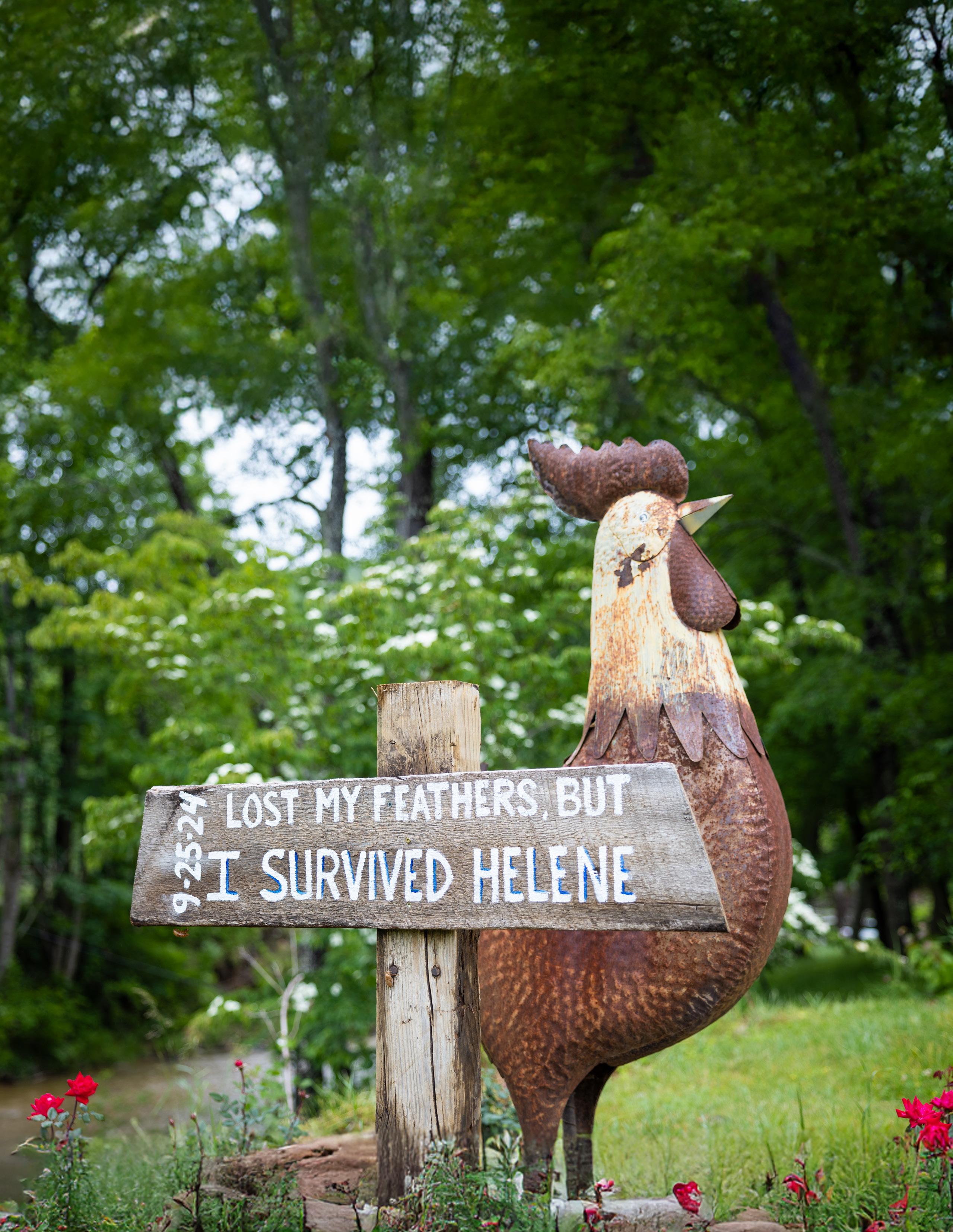
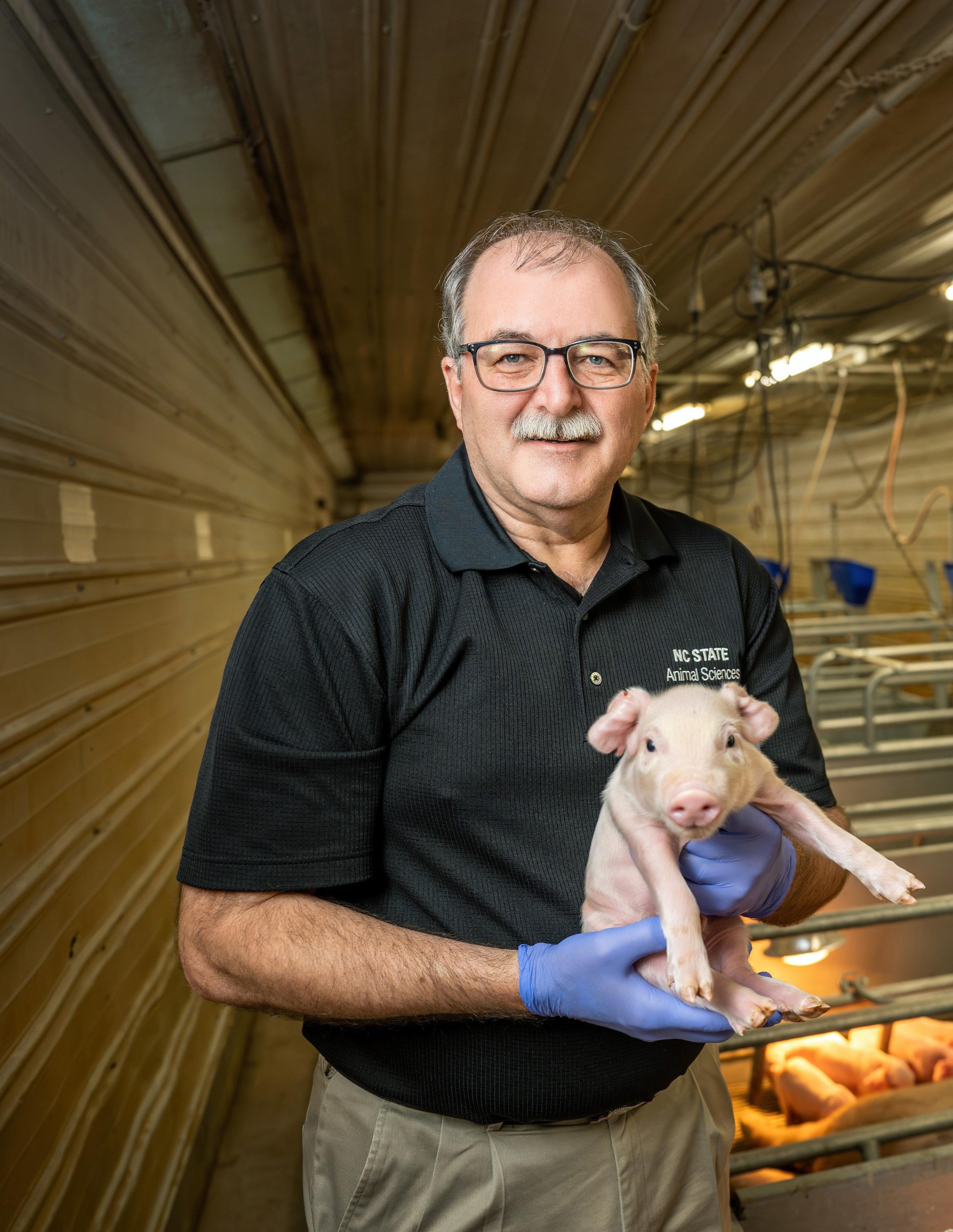



Todd See Animal science department head
As a geneticist, Todd See, head of NC State’s Department of Animal Science, understands growth and change. He’s seen plenty of both during 17 years in leadership, remaining steadfast as enrollment nearly doubled, the pork industry restructured, and data science and technology transformed production. Perhaps the only thing that hasn’t changed is his office, which looks much the same.
Continued on page 38


Stories from NC State’s College of Agriculture and Life Sciences
For 65 years, the Agricultural Institute has shaped the next generation of agricultural leaders. Today, AGI continues to focus on workforce development and creating career pathways to one of the state’s largest industries.
José M. Bruno-Bárcena’s love of cheese, cultivated in his hometown of Cabrales, Spain, has grown into a full-fledged fascination with bacteria and the use of fermentation and microbes to support gut health as we age.
When Hurricane Helene tore through western North Carolina last fall, Extension experts plunged themselves into local recovery efforts. A year later, we reflect on the selfless acts of service that defined the storm’s aftermath and explore the road to a more resilient future.
In 2026, the JC Raulston Arboretum will celebrate its 50th anniversary and usher in the golden age for this beloved teaching garden and leader in horticultural preservation and conservation.
34 Cracking the Corn Code
36 Inspiring Tomorrow’s Global Changemakers
38 I AM CALS
On the cover > A whimsical rooster at River Oak Farm in Yancey County stands as a symbol of hope and determination in the wake of Hurricane Helene. Owner Roger Young kept his sense of humor in the aftermath of the storm and is focused on the future with support from NC State Extension. Photo by David Uttley.

The demand for skilled professionals in agriculture and life sciences has never been greater. Our graduates are stepping into careers that solve global challenges, from feeding a growing population and improving food security to pioneering sustainable solutions and advancing biotechnology. In CALS, we prepare them to lead.
Employers need workforce-ready graduates — professionals who are not just educated, but experienced, adaptable and ready to contribute on Day 1. That’s why CALS takes a futureproof approach, providing hands-on training, experience with cutting-edge science and strong industry connections that set our students apart. Whether managing farms, developing agricultural technologies, leading biotech startups or tackling food and environmental issues, our graduates are in demand.
In this issue, you’ll see how CALS is developing and recruiting top talent through programs that give students the tools to excel in high-impact careers. From the Agricultural Institute’s legacy of hands-on education to innovative research and
mentorship opportunities, we are investing in the next generation of agricultural and life sciences professionals.
We are proud to see our students securing highpaying, fast-paced jobs in fields critical to our future. From agriculture and precision farming to biomanufacturing, food science and plant genetics, CALS alumni drive innovation and strengthen the economy. Employers recognize that NC State graduates are problem solvers, prepared to meet evolving needs in agriculture and life sciences.
The future of agriculture and life sciences depends on the people shaping it, and CALS is leading the way. Thank you for supporting our students and our mission. Together, we are ensuring a stronger, more sustainable future in North Carolina and beyond.
Go Pack!

Garey Fox, Dean College of Agriculture and Life Sciences
4,179 students: Enrollment Scholarships
2,962 Undergraduate students
*Agricultural Institute
Donors
$54.9M+
Extension
291 AGI* students 926 Graduate students
1,300+ Extension experts (campus & counties)
$2.1B
Extension’s annual economic impact on the state 1.4M Contacts generated through 28K+ Extension education programs statewide in donor support
$1.9M+ Scholarship funds awarded
597 CALS students received scholarships
Research
883 Total scholarships awarded
64 Intellectual property disclosures
81 New commercialization agreements
21 Patents issued

From his youth on the family farm to a career at NC State dedicated to supporting farmers, elevating agriculture has been a central tenet of David Monks’ life. After 12 years as associate director of the N.C. Agricultural Research Service (NCARS) within CALS, Monks took the reins in August as associate dean and director of NC State Extension. His appointment follows a national search with input from stakeholders across the university system and broader community. Monks also serves as vice provost for outreach and engagement at NC State, advancing the university’s land-grant mission across North Carolina and beyond.
“David Monks is the right leader for this moment,” says CALS Dean Garey Fox. “He brings deep institutional knowledge, proven leadership across our state and national networks, and an unwavering commitment to the CALS mission through the vital work of Extension.
I’m confident he will lead boldly and collaboratively as we navigate a critical period of change and opportunity.”
NC State Extension is one of the nation’s largest extension systems, with operations in all 100 North Carolina counties, the Qualla Boundary and the Plants for Human Health Institute in Kannapolis. In partnership with local governments and N.C. A&T State University, Extension delivers science-based solutions in agriculture and food systems; youth, economic and community development; health and nutrition; natural resources; and more.
A respected administrator, researcher and longtime Extension advocate, Monks brings more than three decades of leadership experience. He has held key roles within NC State Extension, NCARS and the broader university, building trusted relationships with faculty, county partners, commodity groups and other stakeholders.
< How Extension Works
As co-interim director of Extension, alongside Sarah Kirby, since September 2024, Monks has already demonstrated strong leadership — fostering partnerships, advancing community engagement and aligning Extension with the university’s strategic priorities.
He has previously served as assistant department head in horticultural science and director of CALS research stations and field labs, where he led critical research initiatives and collaborations with commodity organizations.
Monks holds a Ph.D. in agronomyweed science and bachelor’s and master’s degrees in plant and soil science. Throughout his career, he has prioritized programs grounded in research excellence, stakeholder trust and meaningful community impact. He remains a tireless advocate for keeping Extension relevant, accessible and responsive to North Carolina’s evolving needs.
“I’m honored to serve in this role and to continue working alongside our outstanding faculty, staff and partners across the state,” Monks says. “Extension’s strength lies in its ability to connect knowledge with action — to make a real difference in the lives of North Carolinians. I look forward to building on that legacy and leading Extension into its next chapter.”
Steve Lommel is many things. He is a William Neal Reynolds Distinguished Professor of plant virology. He is a champion of the life sciences. He is a builder of impactful interdisciplinary programs and a future-focused leader.
After nearly 40 years with NC State University, the last 12 of which he has spent as CALS associate dean for research and director of the North Carolina Agricultural Research Service (NCARS), Lommel will retire later this year.
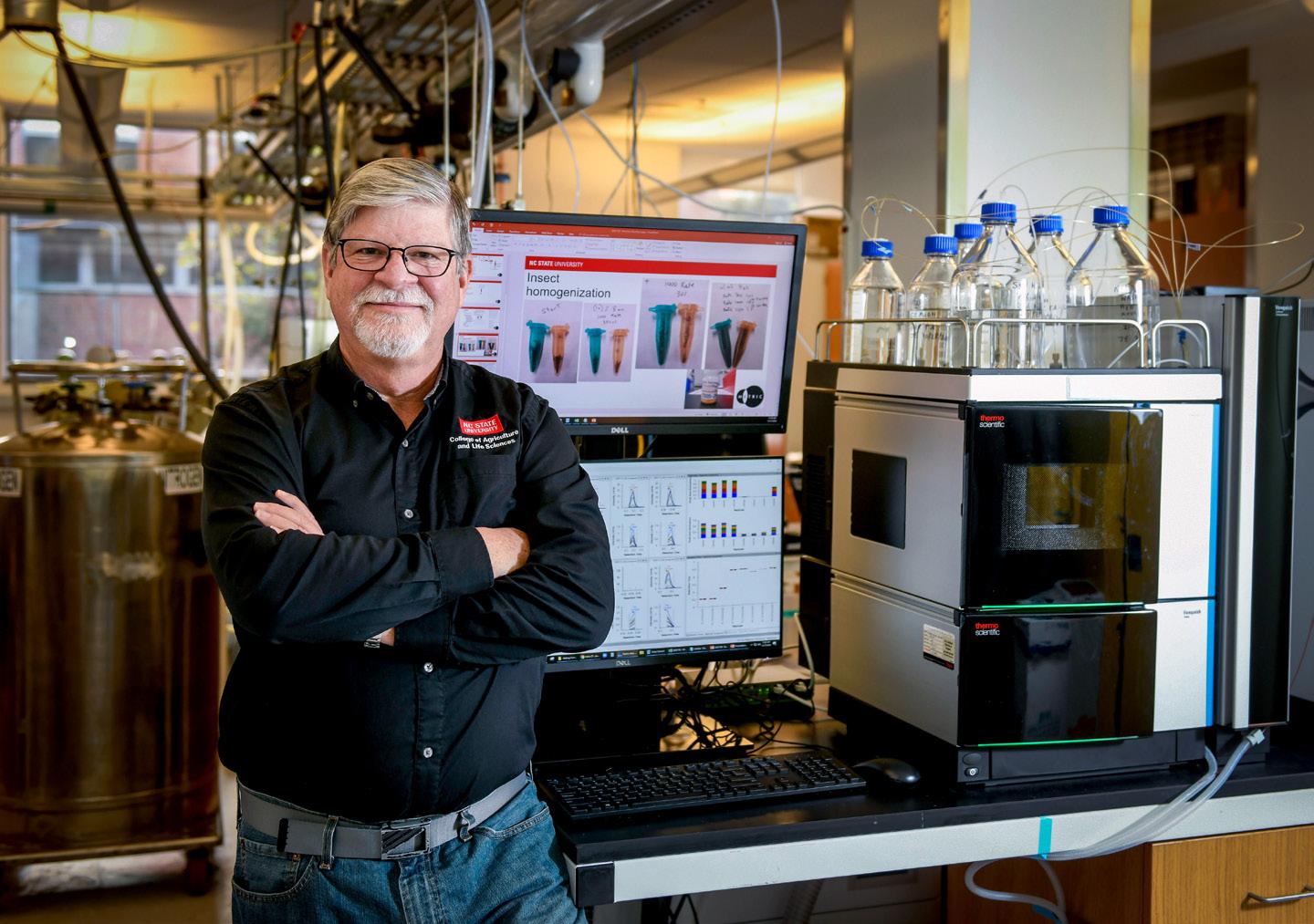
“CALS will miss Steve’s leadership and unflinching dedication to furthering research efforts of the college,” says CALS Dean Garey Fox. “Steve ensured that CALS thrives as a research and development hub for the state’s life sciences and biotech industries. We will build on the foundation he established and ensure our research continues to drive economic prosperity in North Carolina.”
In 1988, Lommel joined what was then NC State’s Department of Plant Pathology, where he led an accomplished research program and played a vital role on the team that first sequenced the tobacco genome. He also taught courses on biotechnology and DNA sequencing, once held the largest grant in the university and discovered ways of using viruses to deliver cancer therapies.
Yet Lommel felt invigorated to do even more for the university’s research footprint than he could as one faculty member. In his first administrative role as the assistant director of NCARS from 1992 to 2001, he advocated for the underrepresented life sciences disciplines of the college at the time. He spent the next 12 years, from 2001 to 2013, as the assistant and associate vice chancellor for research at the university level, where he built the Proposal Development Unit, established core facilities and focused on faculty retention.
“Working in the vice chancellor’s office gave me a broader view of the resources and priorities of the university and showed me how much we could accomplish when we
work with other colleges. It really cemented my belief in the power of interdisciplinary collaboration,” Lommel says.
“The future of our college is with AI and digital agriculture.”
In 2013, Lommel became the CALS experiment station director and associate dean for research. He came in with the revolutionary idea for a state-of-the-art building to support interdisciplinary plant science. That idea would grow to become the N.C. Plant Sciences Initiative (N.C. PSI), which Lommel says is the crowning achievement of his career.
In addition, Lommel helped build out the Genome Sciences Lab, the Biological Research Facility, the proteomics facility and the electron microscope facility. He also assisted with the launch of the Kannapolis campus while overseeing the Plants for Human Health Institute. He hopes to see the momentum he generated continue with updated technology infrastructure at research stations.
“The future of our college is with AI and digital agriculture,” Lommel says.
In retirement, Lommel says he will miss building things — big interdisciplinary things like the N.C. PSI and impactful core facilities. One thing’s for certain: His legacy will have a lasting impact on the success of the university far beyond his tenure.

Timothy Kelliher joined NC State University in July as the Roberts and Mikhail Distinguished Chair in Plant Genome Editing. In this leadership role, Kelliher is the inaugural director of the Genome Editing Center for Sustainable Agriculture (GEC). An expert in plant reproduction and plant breeding technologies, Kelliher has led programs focusing on reproductive biology and technology development for Syngenta Seeds Research since 2013.
“NC State — its close connections with the farming community in the Southeast and its culture of innovation and expertise — is the perfect place to develop the high-quality genetic resources of the future,” Kelliher says. “Genome editing has huge potential to help farmers adapt to challenges while continuing to produce high-yielding, nutritious crops.”
Integrated with the state-of-the-art N.C. Plant Sciences Initiative and its expertise in genome editing and CRISPR, the GEC is poised to transform agriculture. It will offer greater precision and speed in developing new crop and ornamental plant varieties, enhancing traits and increasing resilience to environmental stresses. Kelliher will help set the GEC’s priorities as it accelerates genome editing research in plants and collaborates with the agricultural industry to adapt quickly. The GEC will also work with industry partners to drive intellectual property generation and commercialization of genome editing technologies.
“We are thrilled to welcome Dr. Tim Kelliher to the GEC,” says CALS Dean Garey Fox. “He brings a wealth of experience in applying genome engineering for higher-throughput discovery and delivery of innovative traits to transform plant breeding and germplasm development.”
Kelliher’s position and the GEC were established with guidance from Jude Samulski, professor of pharmacology at the University of North Carolina at Chapel Hill and gene therapy pioneer, whose philanthropic support created the Roberts and Mikhail Distinguished Chair in Plant Genome Editing.
CALS Magazine Fall 2025
Stories from the College of Agriculture and Life Sciences
Editor
Amanda Kerr
Art Director
Patty Anthony Mercer
Staff Writers
D’Lyn Ford, Simon Gonzalez, Amanda Kerr, Krystal Lynch, Alice Manning Touchette
Contributing Writers
Sam Jones, Dee Shore
Photography
Simon Gonzalez, Marc Hall, Becky Kirkland, David Uttley
Videography
Chris Liotta
Digital Design
Sam Jones
Dean Garey Fox
Senior Associate Dean for Administration
Megan Jacob
Associate Dean and Director, NC State Extension
David Monks
Associate Dean and Director, N.C. Agricultural Research Service
Steve Lommel
Associate Dean and Director, Academic Programs
David Crouse
Interim Assistant Deans and Directors, CALS Advancement
Jason Gipe, Kathy Kennel
Chief Communications Officer
Megan Lybrand
Visit Us Online > cals.ncsu.edu
NC State University promotes equal opportunity and prohibits discrimination and harassment based upon one’s age, color, disability, gender identity, genetic information, national origin, race, religion, sex (including pregnancy), sexual orientation and veteran status.
Send correspondence and requests for change of address to CALS Magazine Editor, Campus Box 7603, NC State University, Raleigh, NC 27695 -7603.
10,500 copies of this public document were printed at a cost of $1.72 per copy. Printed on recycled paper.
“Applied ecology is science that can solve a specific problem for the public right away.”
Ryan Tharp Doctoral Candidate
The Big Rock has partnered with NC State for more than 20 years to ensure the prizewinning fish are processed and sent to labs around the United States. The partnership has been crucial for scientists researching the health of the fish and the waters in which they live.
For applied ecology graduate students at NC State’s Center for Marine Science and Technology, it offers hands-on training for crucial lab work and networking with peer institutions, labs and agencies to collectively address fisheries ecology questions.


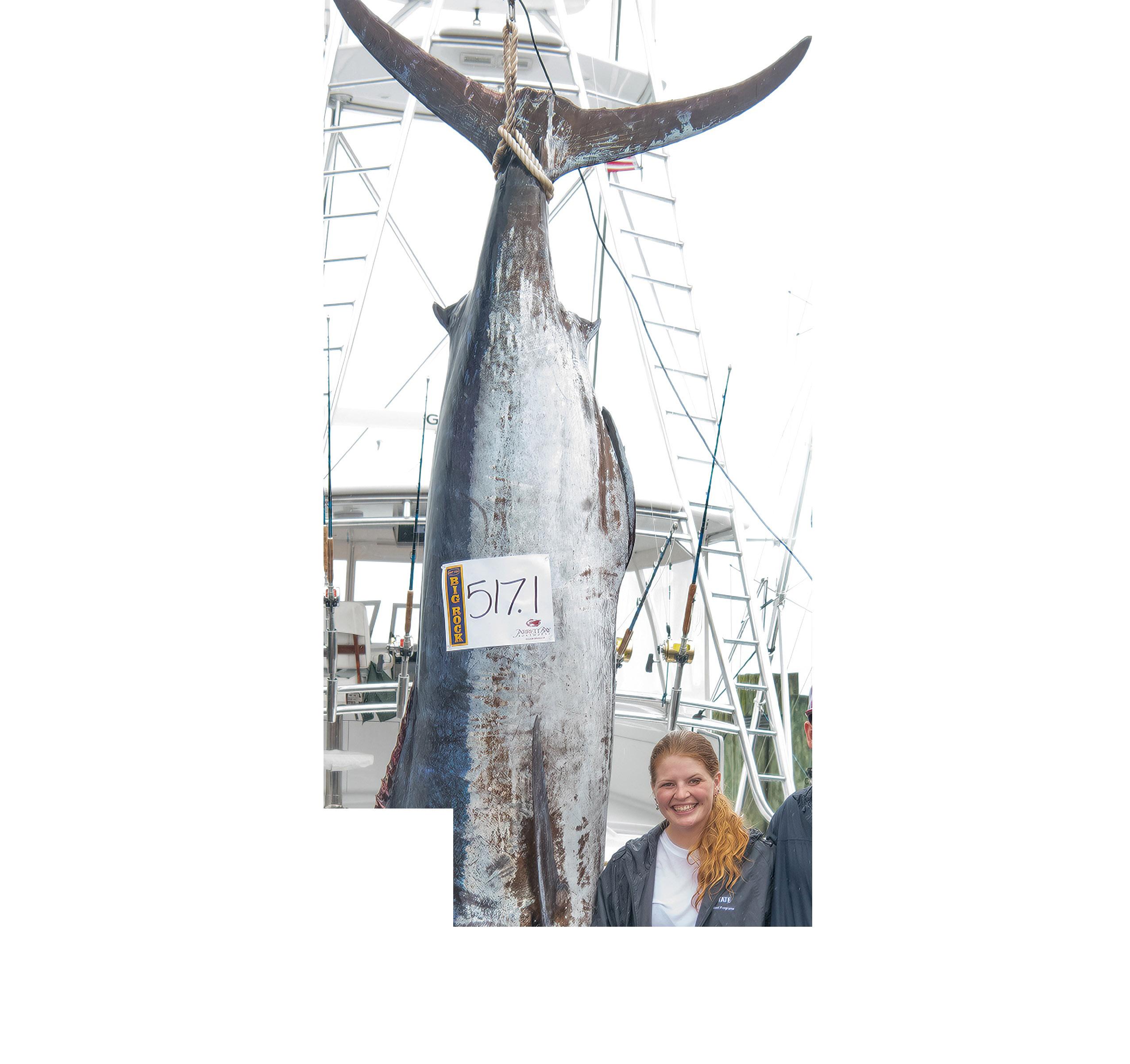
By Krystal Lynch • Contributions by Amanda Kerr
For 65 years, the Agricultural Institute (AGI) at NC State University has shaped the next generation of agricultural leaders, fueling North Carolina’s largest industry. Established in 1959 to meet the growing demand for skilled professionals, AGI provides firstclass instruction to students seeking career-driven, hands-on education.
AGI gives students access to the resources of a major land-grant institution, with programs of study leading to an Associate of Applied Science degree. What began as a small but ambitious program has grown into an agricultural training powerhouse, producing 6,285 graduates who have impacted farms, businesses and research institutions across the state and beyond.
“The future of the Agricultural Institute is bright,” says CALS Dean Garey Fox. “The institute is instrumental in supporting an industry that contributes over $100 billion annually to North Carolina’s economy. AGI provides a small-school, family atmosphere with hands-on education, making its 65 years a success.”
From its first class of 95 students to today’s average enrollment of 330, AGI provides students with a strong
foundation. Small classes, personalized instruction and career-ready skills prepare AGI graduates for the workforce.
Complementing its student-centered approach to career readiness, AGI offers Enhancing Academic Success, a course to support academically challenged students and help improve their performance. Course instructors build relationships with students through one-on-one appointments and needs assessments.
“We have created a success plan for students to work through that highlights what they hope to accomplish and reflect on how they hope to improve,” says Alyssa Degreenia, who oversees leadership development within AGI. “We love teaching and want our students to be successful.”
That support primes students to excel after graduation. A 2023 survey of AGI alumni found that about 20% pursued a bachelor’s degree, while most went straight into the workforce.
Graduates take positions with top agricultural employers like the North Carolina Department of Agriculture and Consumer Services, Murphy Family Ventures, Butterball, Smithfield Foods and AgSouth Farm Credit. Many graduates also become entrepreneurs.
While technical know-how is essential, today’s employers are keen on soft skills
like communication, dependability and critical thinking. AGI helps students not only master practical techniques, but also develop the leadership and interpersonal strengths that set them apart in the job market.
“The Agricultural Institute generates motivated, technically skilled and wellconnected graduates for the industry,” says AGI Director Lee Ivy. “AGI bolsters the workforce with the latest research-based information and enriches communities with highly productive individuals.”
AGI alumni remain deeply connected to their communities. Of those surveyed in 2023, 84% resided in North Carolina, and many participated in professional associations, town councils and community organizations.
Alumni value the lifelong friendships they build with their peers, faculty and staff. Many credit AGI with introducing them to future employers, business partners and clients — connections that continue to impact their professional lives.
Through more than six decades of change, AGI has remained committed to growing the agricultural workforce, strengthening communities and future-proofing North Carolina’s economy. Read on to discover how AGI has shaped the lives of students and alumni.

The AGI Advisory Board
Representatives from 29 companies provide real-world expertise to faculty and students. Here are some of the companies represented:








$158K
$1M in grants
The Agricultural Institute generates motivated, technically skilled and well-connected graduates for the industry. Workforces are bolstered with the latest research-based information, and communities are enriched with highly productive individuals.
Lee Ivy, AGI Director
AGI Majors & Currently Enrolled Students
$123K $1M Scholarship funds awarded in grants
I met my future employers while I was still in school. Also, I met the leadership team at Bland Landscaping while on an AGI field trip. The relationships you develop through AGI can last throughout your career.
Patrick Freeman, AGI ‘99
Area Manager
SiteOne Landscape Supply

A high school job working weekends and summers with a friend’s landscaping company in Durham, North Carolina, first piqued Patrick Freeman’s interest in what would become his career. “I knew early on that I wanted to get into landscaping and turfgrass,” he says. “When I learned about the Agricultural Institute, I knew that’s what I would do.”
AGI’s targeted courses allowed him to gain practical experience in landscaping and turfgrass right away. Small class sizes created a tight-knit learning environment. “With a smaller group, we had the opportunity throughout a semester to get to know everybody in the classroom,” Freeman says.
AGI’s connections to industry also proved invaluable. Freeman met and established relationships with industry professionals, which led to job opportunities immediately after graduation, including positions at Bland Landscaping and then SiteOne Landscape Supply.
“I met my future employers while I was still in school. Also, I met the leadership team at Bland Landscaping while on an AGI field trip,” Freeman says. “The relationships you develop through AGI can last throughout your career.”
Now an area manager for SiteOne Landscape Supply, Freeman credits those AGI experiences for setting him up for success.
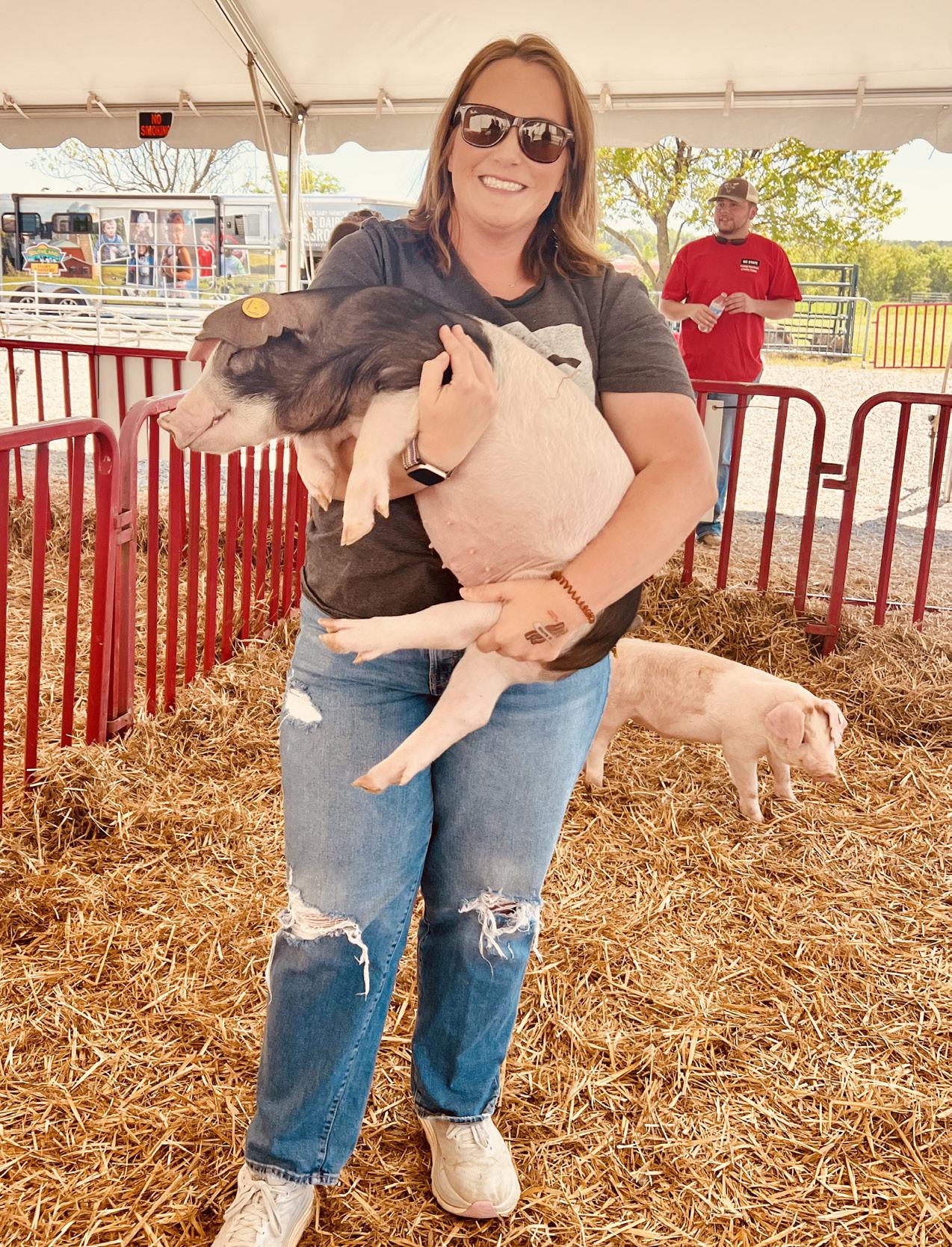
Professor Flowers’ classes were engaging and fun. I looked forward to every single one, especially the labs on the research farm. Now, we’re colleagues, and we still keep in touch.
Bailee Arnold, AGI ‘13 Director of Outreach and Producer Education, NC Pork Council
Bailee Arnold didn’t grow up on a farm in rural Middlesex, North Carolina, but that didn’t stop her from building a career in agriculture. Drawn to working with animals, Arnold initially pursued pre-veterinary medicine, believing it was her path.
However, working in a clinical environment led her to consider other possibilities. After hearing from a friend that AGI offered handson classes with real-world applications, she decided to apply.
William Neal Reynolds Distinguished Professor Billy Flowers, a faculty member with the Department of Animal Science, introduced her to pork production. She liked the subject so much she majored in livestock and poultry management and added a minor in agribusiness management.
“Professor Flowers’ classes were engaging and fun. I looked forward to every single one, especially the labs on the research farm,” Arnold recounts. “Now, we’re colleagues, and we still keep in touch.”
Before graduating in 2013, Arnold took a bold step. During an externship at Maxwell Foods, she said she wanted a job and promised to follow up. She kept her word and secured her first role as a trainee, eventually overseeing 4,000 hogs in Chocowinity, North Carolina.
Arnold remained at Maxwell Foods for seven years until the company closed in 2020. Her AGI network came to her aid. A fellow graduate helped her land a role with NC State Extension’s swine team, allowing her to progress in the industry.
In June 2023, her career came full circle when she joined the NC Pork Council, where she now serves as director of outreach and producer education. Once again, AGI connections helped her land the job.
It was like a light bulb went off. I could go to a big university, get a credible degree in agriculture and be home in two years.
Aaron Blackmon, AGI ‘17 Livestock Agent, N.C. Cooperative Extension, Columbus County Farmer, Bladen County
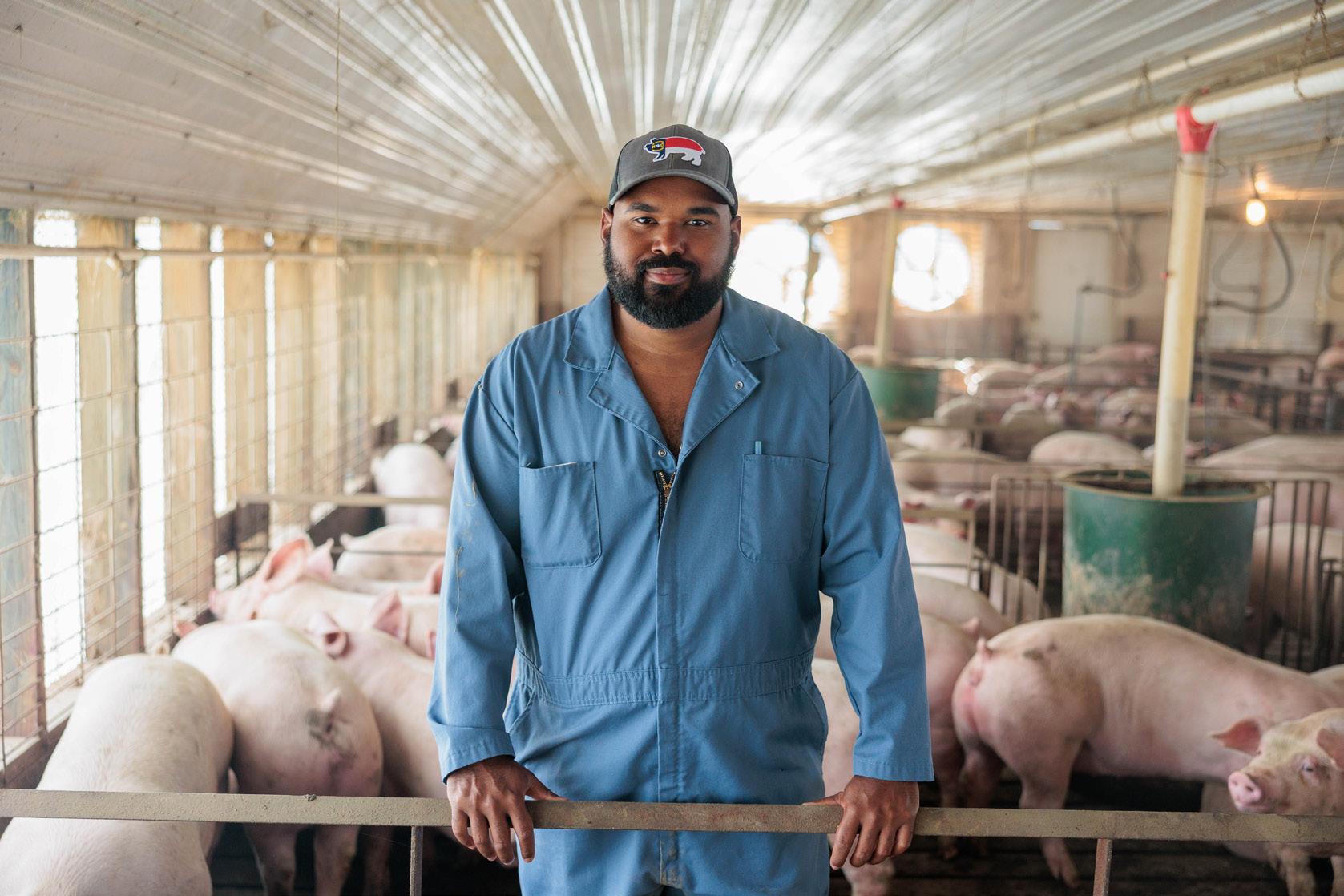
Agriculture was very much at the heart of Aaron Blackmon’s career goals. Blackmon traces his roots to the land through his great-grandparents, who were farmers. Exploring agriculture through FFA (formerly Future Farmers of America) in Lumberton, North Carolina, motivated him to get his first job as a teenager working on a livestock farm in Bladen County.
A high school visit from then-Agricultural Institute director Elizabeth Wilson helped him imagine an attainable career. “It was like a light bulb went off,” he says. “I could go to a big university, get a credible degree in agriculture and be home in two years.”
Blackmon enrolled in the Agricultural Institute in 2014 and earned his associate’s degree in applied science in livestock and poultry management. Later, he completed a bachelor’s degree in 2023 in agricultural business management with a minor in poultry science through CALS.
The real-world coursework and supportive community he found through AGI gave him the confidence to lead and continue learning. He served as an AGI student ambassador and teaching assistant and was named one of the CALS Outstanding Young Alumni in 2021. Today, he splits his time between running his own farm in Bladen County and serving as a livestock agent for N.C. Cooperative Extension in Columbus County.
“The Extension job, at its core, is just about helping people,” he says. “There’s not a lot of glory with our job, but I enjoy helping people and making their farms or operations successful. I do the best I can for the county so we can have a strong program for the future.”
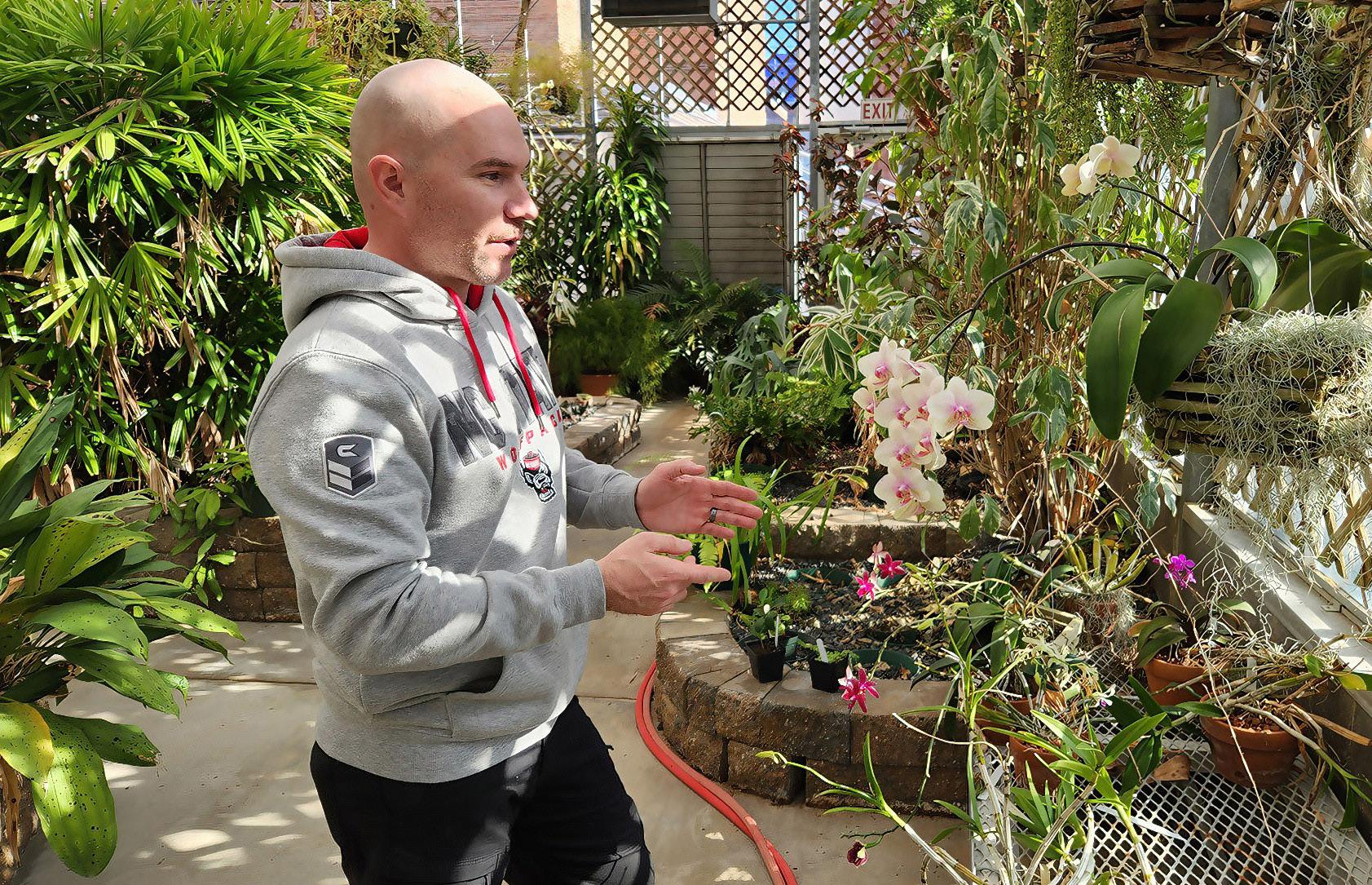
The bright colors and patterns of orchids first caught Wes Fox’s eye when he was stationed in the Pacific while serving in the U.S. Navy.
“Orchids are amazing,” he says. “They’re the second-largest family of flowering plants on Earth. With all the hybridized species, it’s estimated that there are nearly 100,000 different types of orchids.”
Fox’s interest in flowers and plants blossomed, and the recently retired 20-year Navy veteran decided to grow his passion for horticulture when he made the shift to civilian life. After settling in Fayetteville, North Carolina, Fox decided to pursue an associate’s degree in horticultural science management through AGI.
“I graduated from high school 22 years ago, so attending AGI felt better than jumping right into a four-year horticultural science program,” Fox says.
Support from the Sycamore Stipend Fund for Veterans in the Agricultural Institute has provided crucial financial support, enabling Fox to focus on his studies.
I graduated from high school 22 years ago, so attending AGI felt better than jumping right into a four-year horticultural science program.
Wes Fox
Current AGI Student
From the military to college, Fox’s thirst for knowledge has flourished.
NC State Extension Horticulture Specialist and Associate Professor Barbara Fair’s no-nonsense teaching style resonates with Fox and motivates him to learn. “She’s straightforward, knowledgeable and willing to go above and beyond,” Fox says. “When you engage with her and ask questions, you can see she enjoys what she does.”
Understanding the intricate processes behind plant growth and development motivates Fox, and he wants to contribute to the field of horticulture through experimentation and discovery. Looking ahead, he plans to continue his education at NC State by pursuing bachelor’s and graduate degrees. He hopes to one day work in the university’s research greenhouses and laboratories.
“I love to learn and listen to the instructors talk about one narrow aspect of a chemical process in a plant, then immerse myself in researching the topic,” he says. “I’m in school because I like growing plants, and I’m intrigued with them.”
Whether you’re just starting out or starting over, no one has it all mapped out. It can be overwhelming to follow an unfamiliar path, but sometimes the risk is worth the reward.
That was the case for Alexander Brown. When he graduated from high school in 2021, the Hickory, North Carolina, native wasn’t sure of his next steps. He tried community college, but that didn’t feel right. He kept thinking about the times he visited his cousins’ small hog farm in Tennessee. He liked the hands-on nature of working with animals but wasn’t sure how to turn that interest into something more.
“I was looking for a field where I could apply my work ethic to build a financially stable and rewarding career,” Brown says.
After doing some research, he applied to the Agricultural Institute. “It was really a gamble just due to the fact that I didn’t know much about agriculture,” Brown recalls.
Luckily, he made the right bet. “I came in here not even knowing what a steer was,” he laughs. “Now, my day-to-day classes involve learning how to castrate bull calves, raising chicks and learning how to process meat the right way.”
Brown, who served as an AGI student ambassador to spread the word about careers in agriculture, graduated in May 2025 with an associate’s degree in livestock and poultry management. He immediately had a job lined up as an operations management trainee at Perdue Farms in Concord, North Carolina. It’s a position he never would have considered were it not for the encouragement of Lynn Worley-Davis, who serves as AGI’s livestock and poultry management coordinator.
“She advocates to us that we can think outside of the box, and we can have jobs outside of our comfort zones,” Brown says.
Long-term, Brown hopes to leverage what he’s learned through AGI and his experience at Perdue to start his own farm and butcher business.
I was looking for a field where I could apply my work ethic to build a financially stable and rewarding career.
Alexander Brown, AGI ‘25 Operations Management Trainee, Perdue Farms

The wide array of job opportunities within agriculture, from companies like Bayer to small commercial farms, was appealing to Bryce Benzing. But like Alexander Brown, she didn’t know where she might fit in. AGI seemed like a good place to start.
“What drew me to AGI was the fact that it was a twoyear program, and it was that perfect foot in the door to explore my interest in agriculture,” Benzing says.
As a new high school graduate, Benzing enjoyed the field tours to various farms and businesses during her first year with AGI. “Then all the classes I took, it was a lot of hands-on experiences with going to the labs, working with different animals or even being in my turf classes, which allowed me to see new sides of the industry as well,” she says.
Joining the AGI Club offered even more chances to network with industry professionals, participate in service projects and bond with her classmates.
“I gained a lot of lifelong friends,” says Benzing, who served as AGI Club president for the fall 2024 semester. “The club definitely brings people together and builds a great sense of community.”
A summer internship with Sydnor Angus Farm in Siler City, North Carolina, gave Benzing experience assisting with animal care and managing the farm’s facilities while also helping with crop production at neighboring farms.
“It boosted my curiosity to understand more about how the business side of things connects to the farmer’s dayto-day work,” she says.
After Benzing graduated in December with her associate’s degree in agribusiness management, her ongoing work at the Angus farm made her realize she wanted to continue learning how to help agricultural businesses thrive. Now, she’s pursuing her bachelor’s degree in agricultural business management through CALS.
“Figuring out how to make more profits to help farmers grow their businesses, I feel like, is a cool door to explore.”
I gained a lot of lifelong friends. The AGI Club definitely brings people together and builds a great sense of community.
Bryce Benzing, AGI ‘24 Current student pursing B.A. in CALS

The Golden LEAF Foundation, a nonprofit organization in Rocky Mount, North Carolina, is committed to breathing new life into the state’s tobacco-dependent, economically distressed and rural communities to create opportunities for growth and innovation.
The foundation’s nearly $1 million investment in the Agricultural Institute’s student recruitment and job readiness programs ensures the institute remains at the forefront of agricultural education.
AGI applied the foundation’s funding to the following initiatives:
> The Agricultural Operations Certificate supports the demand for qualified managers in the agriculture industry, focusing on trends within the agricultural workforce and management of personnel.
> The Food Animal and Poultry Processing Curriculum introduced three courses that address the immediate need for highly trained, qualified professionals in the state’s meat processing industry.
> Internship stipends aid students interning in Tier 1 or Tier 2 North Carolina counties, where support is critical for economic growth. The program has connected students with career opportunities even after their first year of study.
> Mentoring teams of graduate, fouryear, two-year and high school students assist AGI in boosting recruitment from rural counties. Additionally, students are educated on agricultural careers in their local communities.
Wanting to pay it forward, more alumni are giving back to the next generation of agricultural leaders, including brothers Pender and Alan Sharp, who graduated from AGI in 1971 and 1980, respectively.
® Senior Lecturer Jonathan Phillips discusses production costs in his Introduction to Agricultural and Resource Economics class.
In 2022, the Sharps created the Sharp Family Farms Inc. AGI Scholarship to help newly enrolled students from rural North Carolina counties, including Wilson (first preference), Edgecombe, Greene, Johnston, Nash, Pitt and Wayne.
To support the institute’s meat processing curriculum, the brothers, who also own Flowers Slaughterhouse, created the Flowers Slaughterhouse AGI Scholarship to support students from the same counties majoring in livestock and poultry management who have an interest in meat processing.
“We felt a connection with the university, and we wanted to be a part of its growth, a part of its future, and try to help some kids along the way,” says Pender Sharp.
Additionally, a new initiative spearheaded by AGI Advisory Board Chair John Michael Scott aims to launch the AGI Young Alumni Endowment for first-year student scholarships through contributions from recent AGI alumni.
“We need a way to provide more scholarships for first-year students and a way for the young alumni to give back,” says Scott, who graduated from AGI in 2018. “What’s better than a gift that gives forever?”

By Sam Jones
Deep in the limestone mountains of Asturias, Spain, wheels of a precious blue cheese stacked on wooden shelves emitted an aroma so wild and musty it made his eyes water. He cut one open to reveal rich networks of bluegreen veins and deep blue pockets. Such are the childhood memories of José M. BrunoBárcena, who grew up fascinated by the microscopic world inside his extended family’s Cabrales cheese caves.
“I was always very drawn to the universe of bacteria that makes this famous cheese from my homeland,” he says.
He took that curiosity with him all the way to Argentina in his quest to pursue his passion for biology. Since arriving at NC State University over 20 years ago, Bruno-Bárcena, a professor in the Department of Plant and Microbial Biology, has applied his love of fermentation and microbes to much more than cheese. He has developed biodegradable plastics, discovered prebiotics, evaluated fungicides and explored new biofuels. Though varied, his research always centers on the uncommon intersection of bioprocessing and molecular biology, human health, and the environment.
Far from the mountains of northern Spain, Bruno-Bárcena’s lab in the heart of one of the world’s preeminent biotech hubs has allowed him to form partnerships with many private companies. He lends his bioprocessing expertise to conduct economic feasibility studies and help solve industry challenges.


Growing Startups
Ummino
$1.75M Raised to date 9 Employees CALS — $465.8M
Total dollars raised by CALS startups
1,013 Total jobs created by CALS startups
48 Total CALS startups (since late 1980s)
“The goal with any project we took on was making sure that it didn’t stay within the four walls of our lab,” says Madison Moore, a former Ph.D. student of Bruno-Bárcena.
With the entrepreneurial spirit that Bruno-Bárcena embodies, his ideas and discoveries were bound to find new life beyond the confines of campus. In 2022, he joined forces with Andrea Azcarate-Peril, a professor at UNC-Chapel Hill, to launch a company based on their research. Ummino was founded with the goal of addressing unhealthy aging due to imbalances in the gut microbiome.
As we age, we are exposed to processed foods, pollution, antibiotics and other stressors that weaken our gut microbiome. This community of microorganisms helps us digest our food, absorb nutrients and strengthen our immune system. When it’s compromised, we are left more vulnerable to chronic diseases, digestive issues and mental health problems. For these reasons and more, the gut microbiome could be a key to unlocking the secrets to healthy aging.
Through his company, Bruno-Bárcena is targeting weakened guts with two different prebiotic solutions: a prebiotic powder and a lactose-converting enzyme.
For the powder, Bruno-Bárcena says he started with a simple question: “What is in breast milk that is so good as to nourish our babies?” And then: “Can we deconstruct breast milk and bring its health benefits to everybody?”
After decades of investigating these questions, Bruno-Bárcena and his collaborators have developed Hummino, a prebiotic that selectively restores the balance in our microbiomes and boosts our immune system. The 20 years of science behind Hummino is based on compounds found in human breast milk called human milk oligosaccharides (HMOs), which are responsible for supporting the development of a newborn’s immune system by feeding their microbiome.
The second solution — the enzyme — was developed to “transform milk into a superfood” by converting the lactose in dairy products into fiber. Not only does it improve the digestibility of products like yogurt and milk, Bruno-Bárcena says, it also reduces the sugar content and produces prebiotic fiber that feeds a healthy microbiome — a triple win for dairy lovers.
Yogurt companies could use Bruno-Bárcena’s enzyme to create a yogurt with less lactose, more fiber and 55% to 90% less sugar, all without raising the price for the consumer.
“This is food as medicine,” Bruno-Bárcena says. “Instead of the food we eat making us sick, we can eat food that rebuilds our microbiome and makes us healthier.”
Bruno-Bárcena has come a long way from the dairy farms of Spain to his dairy-transforming lab in Raleigh. But something tells us he has more ideas in the works — they just need a little more time to ferment.
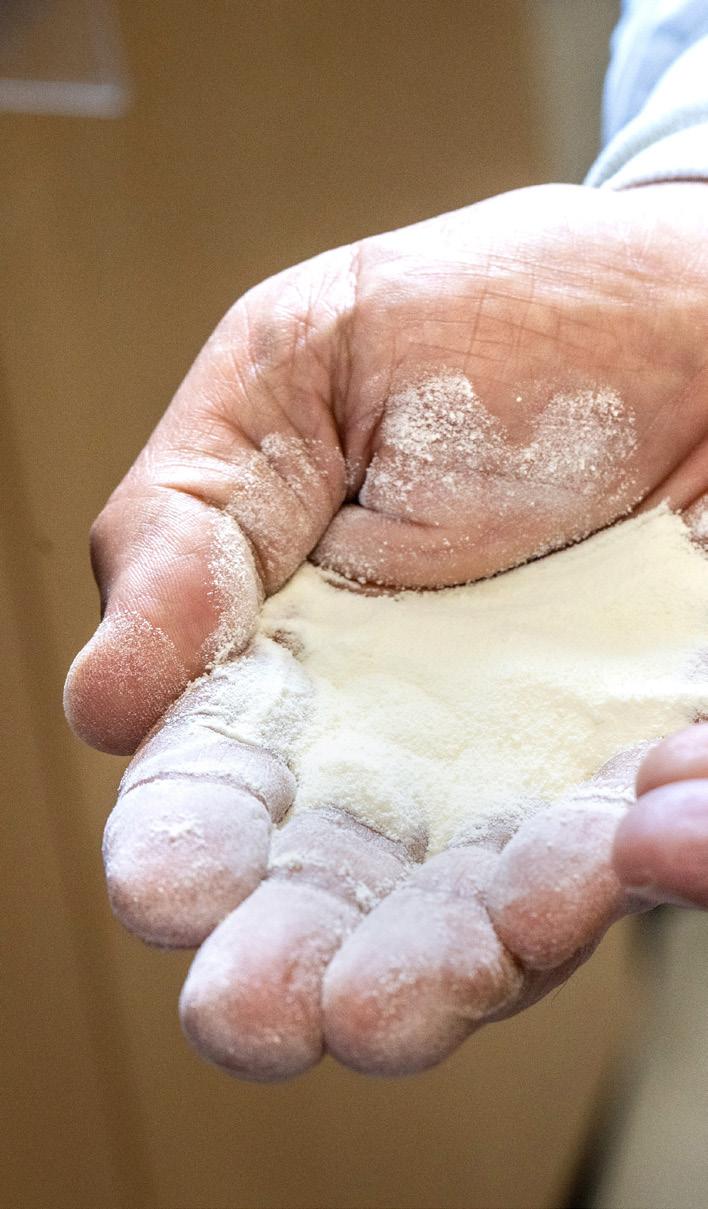
Prebiotics are a type of dietary fiber that feed beneficial gut microbes. While prebiotics originate in everyday foods, they can now be found in products of all kinds: powders, drops, gummies, sodas and pills.
Probiotics are the actual live microorganisms found in fermented foods that add to and diversify the gut microbiome. They work with prebiotics to promote a healthy gut.
Every fall, Bruno-Bárcena teaches a half-semester course titled Fundamentals of Microbial Cell Biotransformations that teaches students the theory and practice of fermentation, including the microbial processes used to make bread, beer and wine. It’s a crash course in bioprocessing designed to give students hands-on training with the specialized equipment that companies use on a daily basis. His hope is that it prepares students for a lustrous career in industry.

In José’s lab, we were working on real-world problems for real companies that were right down the street. Working in his lab opened up my eyes to how research can have an endpoint that matters and can make a difference.
Madison Moore, ‘24
Ph.D., functional genomics
Scientist, Novonesis
Because of the specific training and experience I gained from José’s lab, the company I work for in Belgium was willing to invest in a visa for me to come work for them. For the past two years, I have been working as the lead scientist for a startup that makes alternative protein. The lab-scale experiments I designed impressed investors enough to put their money on us so we can keep operating.
Madiha Nazir, Fulbright Scholar, ‘22
Ph.D., microbiology
Lead bioprocessing scientist, Calidris Bio
In José’s lab we were taught scientific techniques which translated directly to the biopharmaceutical industry that I am now a part of. Working in José’s lab is demanding. But if you are willing to learn, he will teach you.
Satya Makwana, ‘13
M.S., microbiology
Senior quality assurance specialist, Kyowa Kirin
By D’Lyn Ford
As 123 countries worldwide prepare to celebrate the International Year of the Woman Farmer in 2026, we’d like to introduce women with CALS ties who are leading the way in agriculture. Meet an Extension agent, industry research leader, entrepreneur, nutrition scientist and family business builder who are shaping the future.
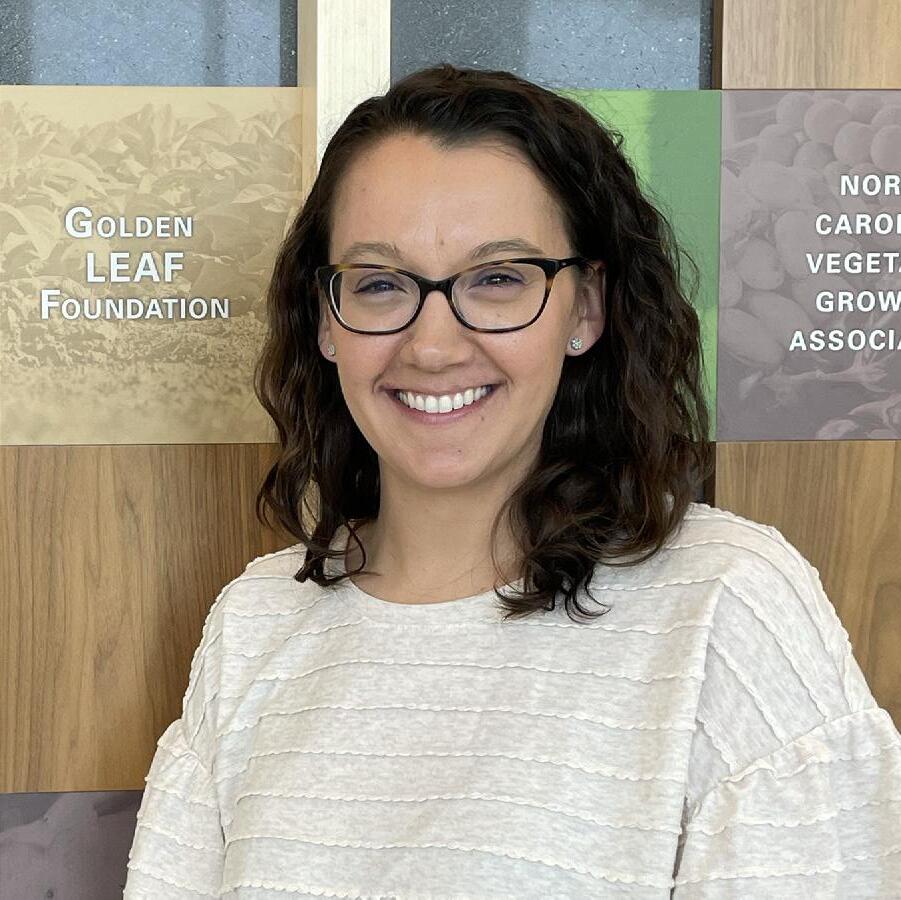
1.2M
women agricultural producers in the U.S.
36% of U.S. agricultural producers are women 1/3 of all farmers in N.C. are women
Farms operated by women sold $222B in agricultural products, accounting for 36% of total agriculture sales in the U.S. in 2022.
Source: USDA Census of Agriculture
Andrea Gibbs has a finger on farming’s pulse as an NC State Extension agent for field crops in Hyde County. An inaugural member of the N.C. Plant Sciences Initiative Extension Agent Network, she connects farmers with the latest research and technology, and provides scientists with feedback from users in the field. With NC State and East Carolina University scientists, Gibbs is exploring how real-time data from sensors can help coastal farmers make decisions. For instance, knowing the water and salinity levels in canals and ditches could enable farmers to prevent crop damage from excess water and saltwater intrusion.
Current role:
> Hyde County Extension agent, field crops
> N.C. Plant Sciences Initiative Extension Agent Network
NC State connections:
> B.S. in animal science, M.S. in agricultural and extension education

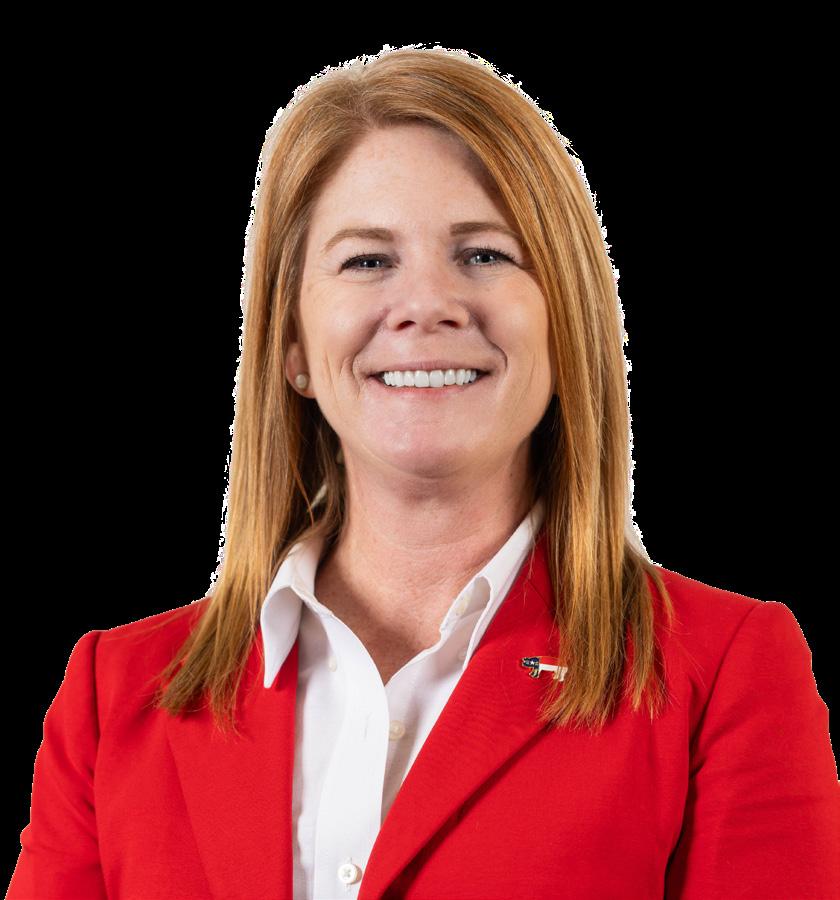
Christina Phillips is in her element directing pork production research and a new extension department for Smithfield Foods. She’s led the NC Pork Council as president, as well as research on upcycling baked goods in pig feed to reduce food waste and provide a corn alternative. With agriculture scholarships, she earned animal science and swine nutrition degrees at NC State. After completing a Ph.D. in animal welfare in Minnesota, she landed a job at Smithfield, near her hometown of Wallace, North Carolina, where she and her husband raise their family.
Current role:
> Senior director of research and extension, Smithfield Foods
NC State connections:
> B.S. in animal science, M.S. in swine nutrition
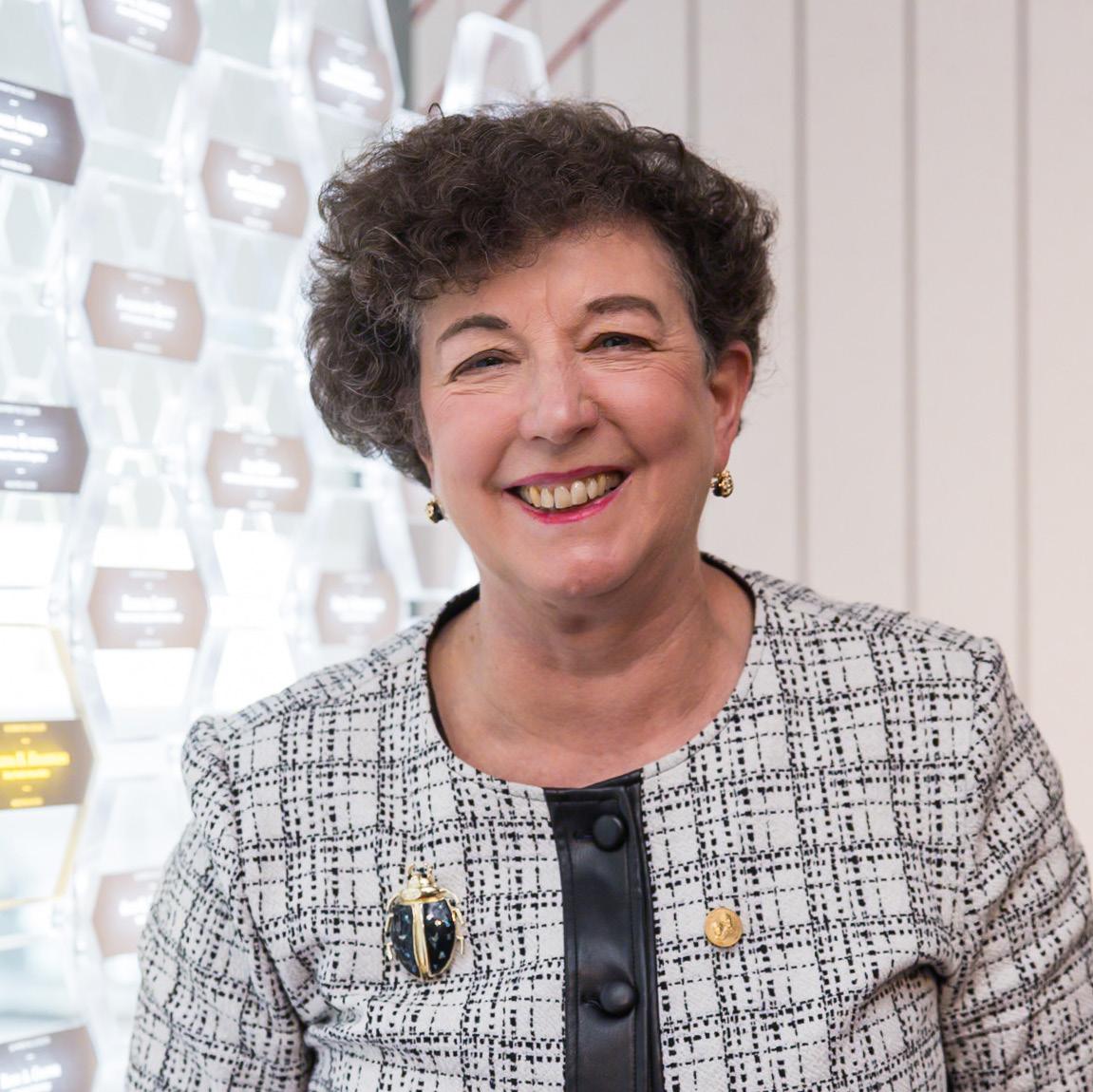
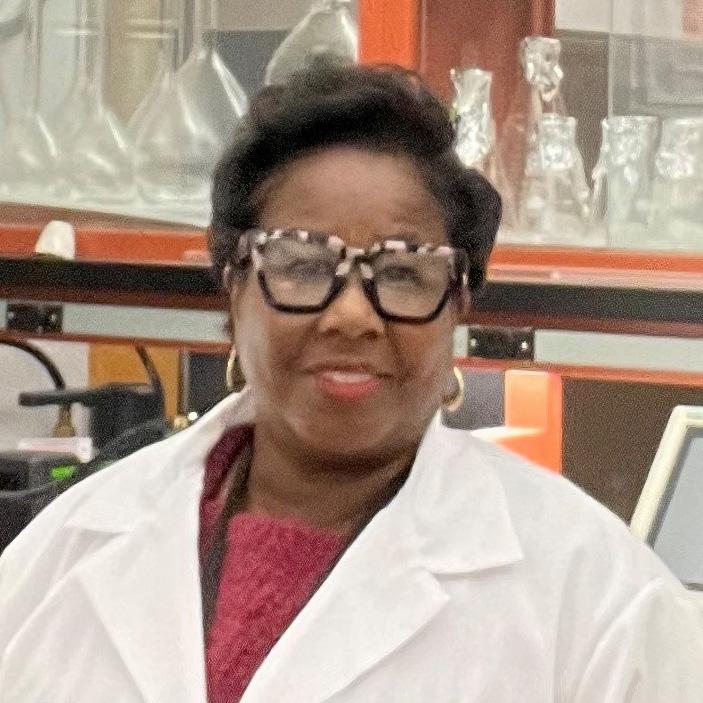
Pam Marrone has achieved breakthroughs with biologicals in 30 years of developing naturally derived products to control agricultural pests and boost plant health. She’s founded four companies, taking Marrone Bio Innovations public on NASDAQ, something only 32 women have done. She’s commercialized more than a dozen products, reaching farm fields and Walmart shelves. With 82 U.S. patents, Marrone is a National Inventors Hall of Fame inductee. What’s next? Exploring biological control of invasive species and advising businesses, particularly women-owned companies.
Current role:
> Co-founder, executive chair, Invasive Species Corporation, Invasive Species Research Institute
NC State connections:
> Ph.D. in entomology
> Member, North Carolina Agricultural and Life Sciences
Research Foundation Board and N.C. Plant Sciences Initiative Commercialization Council
Research chemist Ondulla Toomer studies how peanuts and peanut skins can be used as functional food or feed ingredients. Her research focuses on improving the nutritional content of poultry meat and eggs intended for human consumption by feeding peanuts and peanut skins in poultry diets. This work potentially transforms 40 to 70 million pounds of peanut skins annually from waste into value-added products that improve human and animal health.
Current role:
> Research chemist, USDA Agricultural Research Service, Food Science and Market Quality and Handling Research Unit
NC State connections:
> B.S. in biochemistry, M.S. in physiology, Ph.D. in nutrition
> Adjunct professor, Prestage Department of Poultry Science and Department of Food, Bioprocessing and Nutrition Sciences

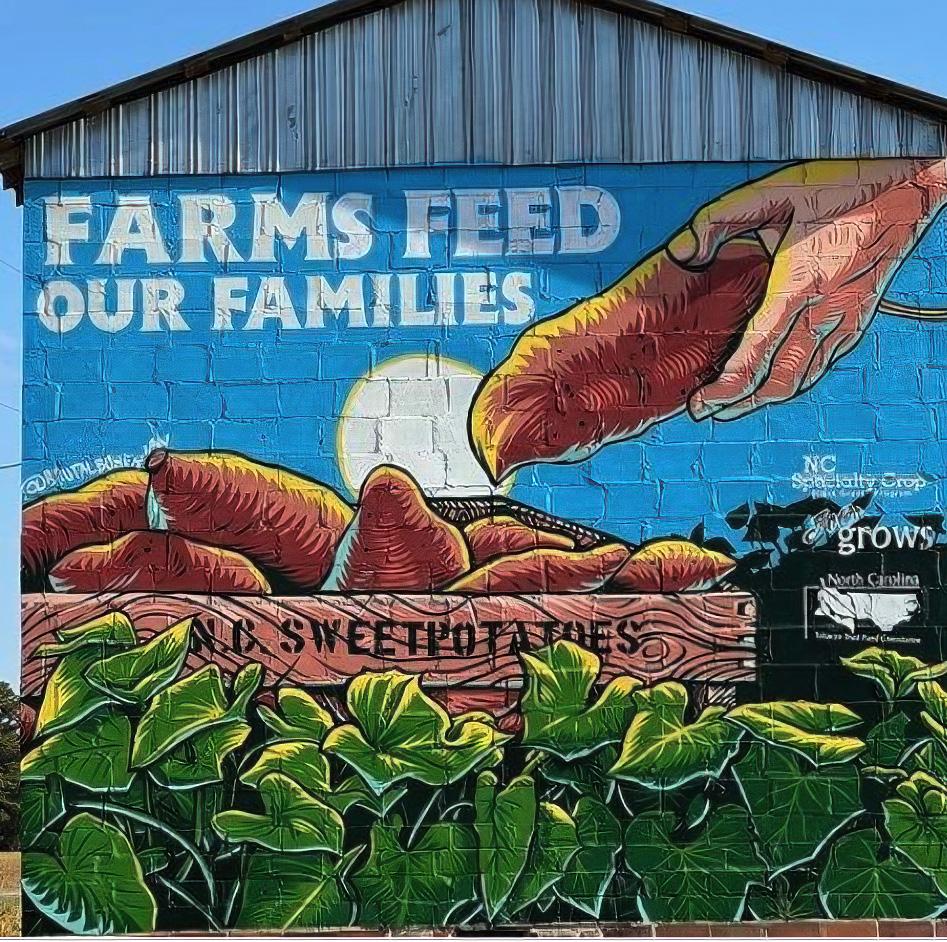
Selling sweetpotatoes to customers on the East Coast and exporting them to Europe and the U.K. is all in a day’s work for Taylor
Rhodes Hill, sales and marketing manager at J. Roland Wood Farms in Benson, North Carolina. She’s the third generation to join the business started by her grandparents, where she applies strategies from her agribusiness degree at NC State and master’s at Mississippi State. One example: Using data analytics, she created a model to determine the farm’s optimal balance of domestic and exported sweetpotato sales.
Current role:
> Sales and marketing manager, J. Roland Wood Farms
NC State connections:
> B.S. in agribusiness
> First scholarship recipient, Gordon Family Farm-to-Philanthropy Program
By Simon Gonzalez | Photos by David Uttley
A hawk catches an updraft and soars over the lush green trees. An oriole flits from branch to branch along the banks of the stream, while a black vulture circles high above.
Closer to the ground, a different type of flyer moves through the air over River Oak Farm, a beef cattle operation in Yancey County. Rather than wings, it has four sets of rotating blades. Instead of looking for food, it is feeding the ground.
The agricultural drone is seeding Red River crabgrass, an annual crop that will become forage and hay for Roger Young’s cows. David Davis, director of the N.C. Cooperative Extension center in Yancey County, is at the controls.
“We’re going to have a hay shortage,” Davis says. “This is a way to get our farmers some hay without having to wait for the perennial crops to recover.”
“I never thought I’d be a drone pilot. We are all trying to figure out ways to help.”
David Davis, Director, N.C. Cooperative Extension Center in Yancey County
The hay shortage was caused by Hurricane Helene, the monster storm that devastated the Appalachian Mountain counties of North Carolina in late September 2024, flooding fields and ruining crops.
The drone-seeding program will help Young stay in business by providing feed for about 80 head of cattle.
“This was a fescue field that was covered in sand and debris,” Young says. “I took a dozer and pushed it out, and then I asked David, ‘What should I do?’ We put annual rye in, and the next phase is drone seeding it with crabgrass. In the fall, we’ll do fescue to reclaim the field. I’m very, very pleased with what David suggested. The forage mass is amazing.”
It is one of many ways Extension experts like Davis are helping communities recover and move forward with cutting-edge programs and dynamic solutions to the worst storm anyone in the mountains has ever endured.
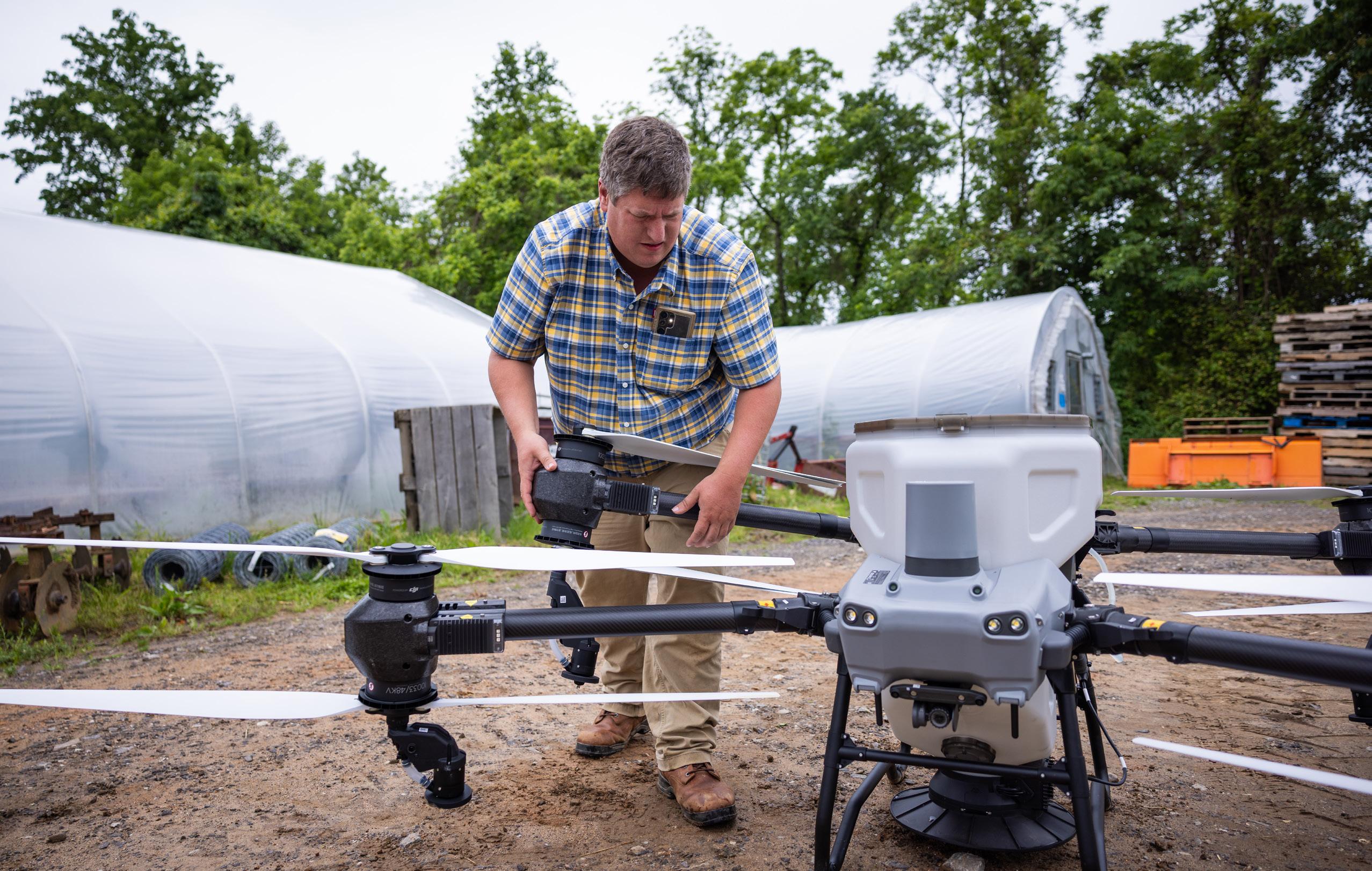
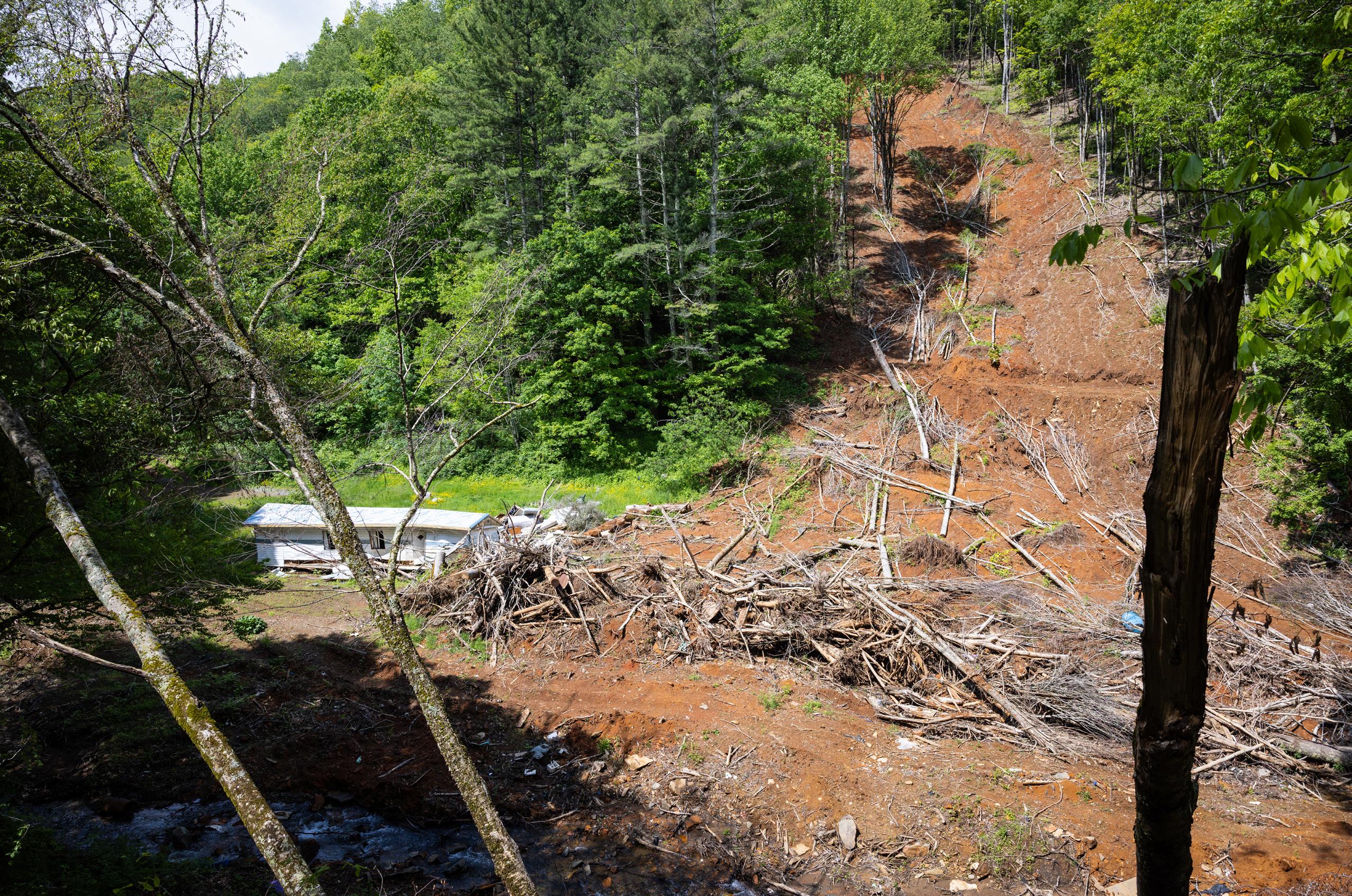
Hurricane Helene caused unprecedented destruction. The quiet creeks that dot the landscape became raging rivers, triggering catastrophic flooding. Intense winds toppled trees and power lines. Roads were destroyed. Communication was down.
“It was apocalyptic,” says Michelle South, Extension livestock agent in Avery County. “That’s the only way to describe it.”
People talk about natural disasters in terms of years — a hundred-year storm, a thousand-year flood. Helene was worse.
“There’s a tree in Yancey County marked with floods through the years,” says Jerry Moody, director of the N.C. Cooperative Extension center in Avery County. “Helene was several feet above any of them. This was a 10,000-year flood.”
There were shortages of food, water and medicine, and no good way to get supplies in. The scope of the disaster seemed overwhelming.
“Everybody has their own horror story,” South says. “Every single one of us.”
N.C. Cooperative Extension is a trusted network of experts from NC State and North Carolina Agricultural and Technical State universities. With 101 centers across North Carolina, Extension agents deliver research-based information and guidance in agriculture, youth development, food and nutrition, natural resources, lawns and gardens, community development and more.
“We’re public servants first and foremost,” says Kendra Phipps, Extension livestock and field crops agent in Watauga County. “We enter this job knowing that’s our role, to give everything we have to our community.”
In the days and weeks after Helene, Extension agents staffed emergency operations centers; set up sites that distributed water, food and medicine; helped coordinate airdrops of vital supplies; and worked with partners to organize donations and distribution of hay, feed, fencing and other livestock supplies.
“Job descriptions got set aside,” says Jim Hamilton, director of the N.C. Cooperative Extension center in Watauga County. “We knew what needed to be done and went full bore into it.”
Extension personnel from across the state joined local agents in responding to immediate needs. Agents from coastal counties, seasoned in disaster response and management, shared their expertise. Others collected relief supplies to send to the mountains.
“Agents in the east really showed up for our agents in the west,” says Stephanie Ward, NC State Extension dairy specialist and associate professor in the Department of Animal Science. Ward, a native of Haywood County, and her husband, Jason Ward, an NC State Extension specialist in biological and agricultural engineering, delivered Starlink receivers and a generator. With the help of the CALS IT team, the receivers were set up at the Mountain Horticultural Crops Research and Extension Center in Henderson County.
“Once we had communication, we were able to coordinate with NCDA [the North Carolina Department of Agriculture and Consumer Services] to get donated supplies to their response teams,” Ward says.
As food, water and household items reached the region, Extension agents and specialists pivoted to helping with agricultural needs — setting up distribution sites across the region where farmers could receive hay, fencing and other desperately needed supplies. Donations came in from across the country.
“That was the place Extension could step in and help,” says Ward, who coordinated efforts to manage donations. “We put together an online portal for people to submit what they had to donate. We had a team of agents working to get the donations to distribution centers.”
Sheila Greene, owner of North Fork Farm in the northwest part of Watauga County, was among those who received hay and fencing supplies.
“I literally don’t know what we would have done without [Extension] and the people donating,” she says. “It helped out tremendously.”

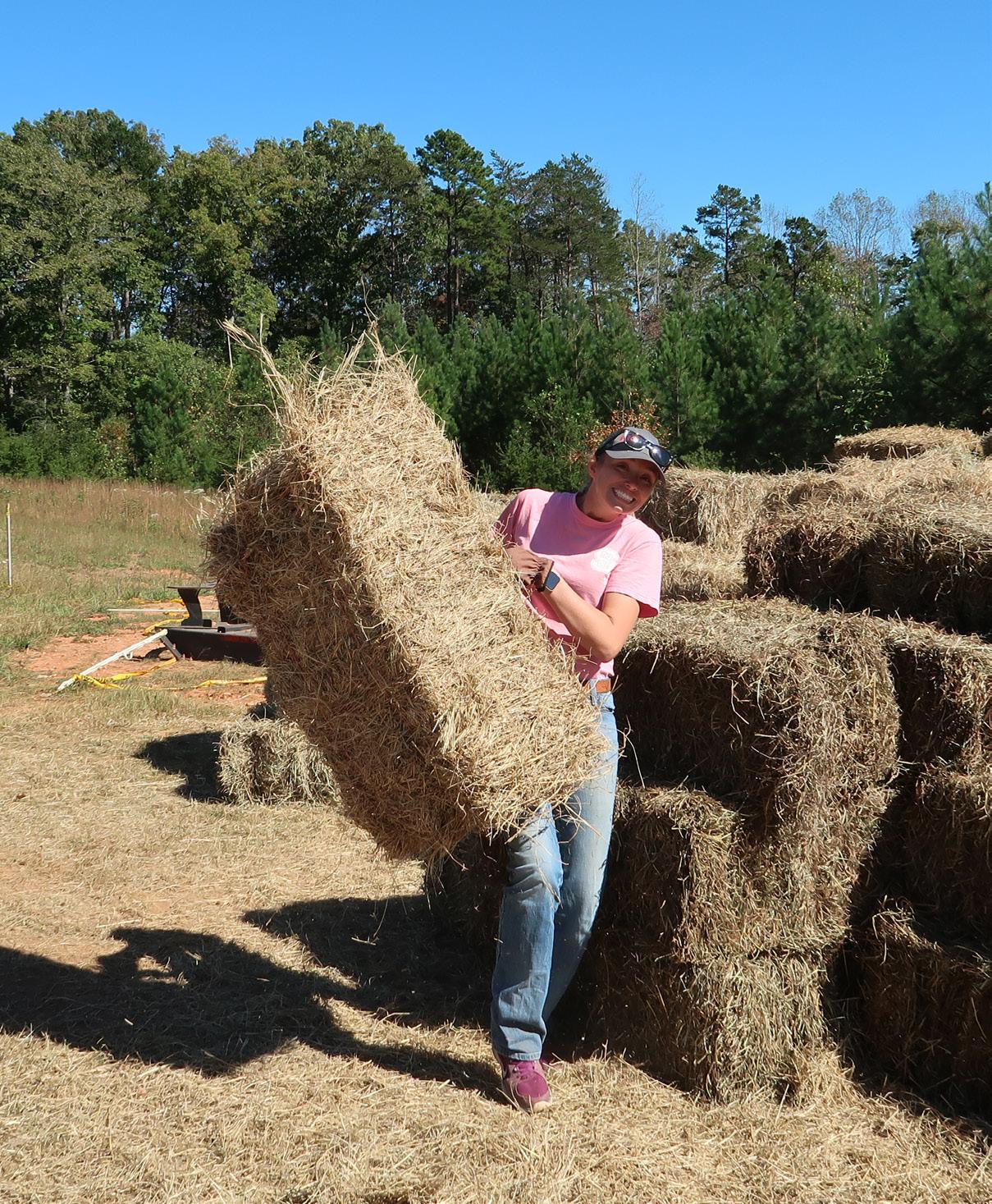
When Hurricane Helene tore through western North Carolina last fall, Extension experts plunged themselves into local recovery efforts to support farmers, families and communities throughout the region.
Arranged food and supplies for livestock
Worked with NCDOT to move 1,000 tractor-trailer loads of Christmas trees and protected Avery County’s $45M Christmas tree industry
Salvaged crops and supported WNC’s $150M ornamentals industry
Extension experts from central and eastern N.C. helped clean storm debris
Staffed emergency operations centers
Advised on food safety and connected people with resources
Researchers from the Department of Crop and Soil Sciences helped assess soil conditions, tested for contaminants and evaluated agricultural risks
4-H agents provided safe environments for youth and programs for stress management
Used irrigation equipment to channel water back into rivers and streams
N.C. Agromedicine Institute provided counselors for those traumatized by the storm

Niki Maness noticed that many of the Helene victims in the disaster recovery center in Yancey County seemed dazed and disoriented. After having their lives upended by the storm, they now had to navigate the often confusing bureaucracy for insurance and recovery assistance.
Maness, an Extension Family and Consumer Sciences (FCS) agent, worked at the center alongside FEMA personnel to help with paperwork and grant applications. When people saw that she was from the county Extension office and heard her local accent, faces brightened. Here was someone who knew what they had gone through.
“People would see Extension, and they knew that we’re from the county,” she says. “They would come talk to me, and then I would help connect them with resources.”
Every Extension team was involved in the recovery. FCS agents gave advice on food safety. 4-H agents provided a safe and engaging atmosphere for young people who had experienced the traumatic storm. Agriculture and horticulture experts provided immediate assistance to farmers and growers.
Sam Marshall, area specialized agent for ornamentals, procured irrigation equipment to channel water back into rivers
and streams and coordinated Extension experts from the central and eastern parts of the state to clean storm debris. His efforts helped salvage crops and support western North Carolina’s $150 million ornamentals industry.
Moody, director of the Extension center in Avery County, partnered with the North Carolina Department of Transportation to figure out how to move 1,000 tractor-trailer loads of Christmas trees out of an area where storm damage had decimated the infrastructure. The effort helped protect the county’s vital $45 million industry.
Soil health was another major concern. Floods stripped away topsoil in some fields, replacing it with rocks. In others, floodwaters deposited layers of sand and silt, potentially introducing pathogens. A team of researchers from CALS’ Department of Crop and Soil Sciences visited western North Carolina to assess soil conditions, test for contaminants and evaluate agricultural risks.
The North Carolina Agromedicine Institute, a collaboration of East Carolina, NC State and N.C. A&T State universities, provided counselors for those traumatized by the storm, particularly producers facing a difficult recovery.
“A therapist comes to our office once a week,” Moody says. “I direct her to my growers that I think are at risk.”
Finding solutions to problems is in Extension’s DNA. But helping people rebound after Helene has forced some out-ofthe-box thinking.
“I never thought I’d be flying a drone. I never thought I’d be coordinating river cleanup and replanting,” says Davis, the Extension director in Yancey County. “These aren’t our normal programs. And now it’s fairly normal.”
For Jordan English, Extension 4-H agent in Buncombe County, the new normal includes incorporating mental health activities in her work with youth.
“This generation has faced a significant amount of learning loss over the past several years. From the COVID-19 pandemic to missing one month of school due to Helene, these youth have faced multiple traumas,” she says. “Kids are resilient, but those traumas are still serious. 4-H has several curriculums and programs that provide lessons on stress management and helping promote emotional well-being.”
Maness used a grant from the National Extension Association of Family & Consumer Sciences to purchase a mobile
kitchen that will enable her to do classes at community gardens and other sites. Some of the classes will focus on preparing meals with foods that have a long shelf life.
“I’ve been focusing on one-pot or no-bake recipes that can be used with canned tuna and rice and how to add more protein and seasonings to change them up a little bit,” she says.
Canning is also a popular topic in an area where power was out for days and weeks.
“I’ve had more classes or questions about canning than I did the entirety of last year,” she says. “People want to learn how to preserve their food.”
Laura Lauffer is an Extension associate with the EmPOWERing Mountain Food Systems program, which works with agribusiness development in 12 western counties. She and her team have focused on providing grants to keep struggling farmers afloat and help others navigate the complex maze of government relief.
“We are working with one of many partner organizations to coach farmers and help them through all this paperwork,” she says.
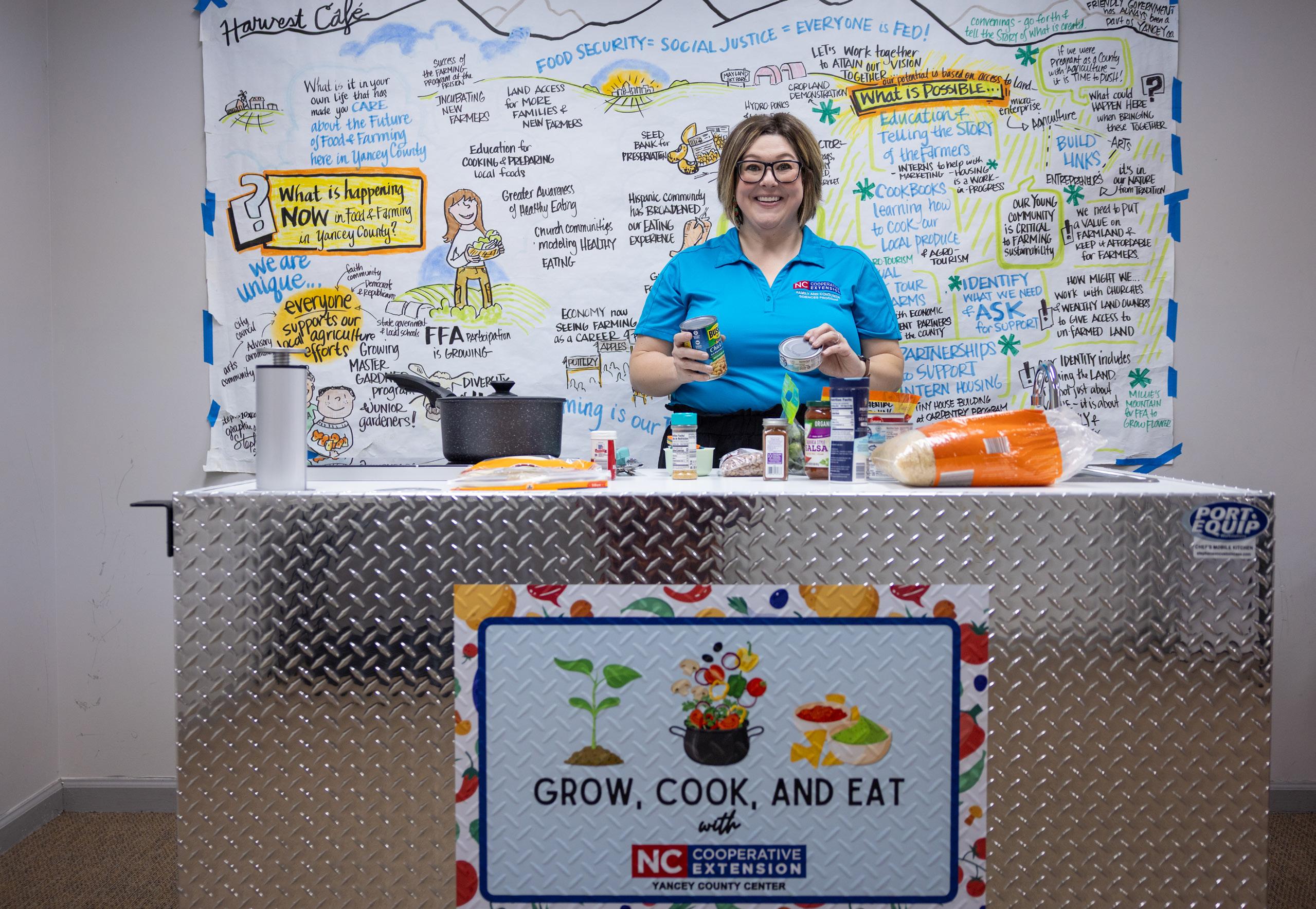
“I’ve had more classes or questions about canning than I did the entirety of last year. People want to learn how to preserve their food.”
Niki Maness, Extension FCS Agent, Yancey County
Jerry Moody points to a field owned by an ornamental grower in Avery County. Trees are still bent over from the floodwaters.
“Those trees are dead; they just don’t know it yet,” he says. Farther down the road is a 25-acre field strewn with boulders and rocks deposited by floodwaters. It used to be a hayfield. Now it’s unusable.
“We lost about half of the hayfields in the county,” says South, the Extension livestock agent in Avery County. “About a quarter of them aren’t coming back. There’s no topsoil, no organic matter.”
The storm was a life-changing event. Jennifer Badger, area specialized agent for agribusiness and a 10th-generation resident of Transylvania County, has had many difficult conversations with producers whose livelihoods are in peril.
“I’ve talked with people who are doing a lot of soul searching and trying to figure out if they can even afford to continue to farm because the river dumped so much silt and rock,” she says. “My job is helping people look at their business objec -
“I don’t believe there’s a recovery. I believe there’s only a restart, because we will never be Sept. 24, 2024, ever again.”
Jerry Moody, Director, N.C. Cooperative Extension Center, Avery County
tively. And it’s really hard. How do you tell someone who is a multigenerational farmer that it’s not economical for them to do it anymore? How do you tell someone that?”
Months since Helene hit, producers and Extension agents are still coming to grips with the extent of the damage.
“I don’t believe there’s a recovery,” Moody says. “I believe there’s only a restart, because we will never be Sept. 24, 2024 [the day before Helene], ever again.”
It’s a daunting task, but Extension experts will be there to help.
“We’re going to do anything and everything that we can to help them,” Badger says. “We’ve got grant programs and workshops on how to rebuild and how to look at doing something different.”
Different could mean helping producers find new streams of income. Or different could mean encouraging growers to modernize long-standing practices.
“Most of these pastures were established 60, 70, 80 years ago or longer,” says Matt Poore, NC State Extension specialist in ruminant nutrition. “There have been improvements in

genetics and plants in that time. In many cases, it will allow them to upgrade what they grow, what they plant, and how they think about it. That’s a very positive thing going into the future.”
Young, the owner of the field David Davis is seeding with his drone, is one producer who is eager to learn.
“The disaster has caused me to look at different things,” he says. “Most of us up here farm the way our grandfathers did. And that wasn’t necessarily the best way. I’m trying to run the farm using the best practices. David has been very helpful in making suggestions.”
Glimmers of Hope
Erin Silver, a 4-H agent in Mitchell County, represented Extension at many emergency briefings after Helene. She was out in the community, helping organize and distribute supplies. She was able to tell new audiences about her youth programs. Her 4-H clubs have grown since the storm, and she secured a sponsor for a livestock program.
“We have a higher number of participants now than we did last year at this point,” she says. “It’s definitely growing.”
Amy Fiedler, owner of Springhouse Farm in Watauga County, was heartbroken when floodwaters destroyed her roadside farm stand. A grant from EmPOWERing Mountain Food Systems helped her rebuild in an area of the county far from a grocery store.
“Our produce stand has always been based on the honor system,” she says. “We stock it, and people get what they need. It has an impact in the way that it fosters community.”
The recovery will be long and hard. But Extension will be there every step of the way — sowing new seeds, rebuilding what was washed away, and helping western North Carolina communities and farms take flight again.

“Our produce stand has always been based on the honor system. We stock it, and people get what they need. It has an impact in the way that it fosters community.”

By Amanda Kerr
For some, going to a four-year college right after high school is the expected next step. For others, the road to a bachelor’s degree looks a little different. Maybe they’re unsure of their career path. Perhaps they’re stalled navigating a competitive admissions landscape. Or perhaps the cost of tuition is a factor.
Ben Snell and Luke West are among the students who started out at one of North Carolina’s 58 community colleges before transferring to NC State and CALS.
In the selective world of college admissions, Snell was not accepted to NC State as a freshman. An FFA teacher connected him with David Crouse, now the associate dean and director of CALS Academic Programs, who offered him another path through a pilot program between CALS and select community colleges.
“He explained how this program would allow me to transfer to NC State with no problems as long as I followed certain criteria,” recalls Snell, who graduated from Orange High School in Hillsborough, North Carolina. “This is when I chose to take classes at Wake Tech Community College.”
After graduating from high school in Pikeville, North Carolina, West enrolled at Wayne Community College instead of applying to a four-year school. With deep family ties to agriculture, he wanted to remain close to home and help out on his family’s farm.
“This pathway offered a smoother transition from high school to the demands of a large university,” West says. “The smaller class sizes and varied teaching styles helped ease that shift and prepared me for the next step.”
Both Snell, who earned his bachelor’s degree in turfgrass science in 2024 and is now pursuing a master’s degree in plant pathology, and West, who is in his senior year in CALS as an agronomy major, say their experience transferring to NC State was a smooth one, thanks to skilled advisors and a lot of planning.
“The amount of support I received was absolutely amazing,” Snell says.
poultry science, turfgrass science, agricultural education and food science. Students participating in the Wolfpack Connect program must complete their associate’s degree to receive guaranteed admission to NC State.
The initiative expands on the university’s digital Transfer Planner tool, which helps students at any of North Carolina’s community colleges map out how their coursework will transfer to NC State and meet degree requirements. Community college students can use the tool from Day 1 to ensure every course they take — or plan to take — aligns with the required courses for their intended major at NC State.
“By creating clearer pathways and providing stronger support, we’re making sure students from all backgrounds — and all parts of the state — can thrive at CALS.”
To make the transfer process from the state’s community colleges to CALS as seamless as possible, Crouse plans to build on a new universitywide initiative called Wolfpack Connect, which will provide a guaranteed pathway for North Carolina community college students to transfer to NC State. Launching in the fall of 2025, the program aims to offer another entry point to the university from participating community colleges.
David Crouse Associate Dean CALS Academic Programs
The goal for CALS, says Crouse, is to open the door to more students, particularly from rural communities, who want to pursue agriculture and life sciences degrees.
The university wants to have a scalable program with partnering community colleges that offers more students from across the state an NC State education.
“We know that access is the biggest challenge, especially for our rural communities, and we want to change that narrative,” says Don Hunt, NC State senior vice provost for Enrollment Management and Services. “I don’t think some students in rural communities feel like they even have a shot at NC State, and we want to let them know, ‘Yes, you do, and here’s how you can get here.’”
NC State’s colleges can choose which majors are eligible for Wolfpack Connect based on demand and academic criteria. CALS will prioritize high-need majors such as
To ensure that community college students transfer into their preferred CALS major on schedule, Crouse envisions offering more support to Wolfpack Connect students, including focused advising, potential cross-registration of courses and regular communication.
“We are the largest university in the state of North Carolina, and we are the land-grant university, which means we are the people’s university,” Crouse says. “We want to develop a path for more students to get into the people’s university.”
Broadening Possibilities
Snell and West hope that a clearer path for transferring to NC State will empower more North Carolina community college students to expand their horizons.
“I highly recommend earning an associate’s degree from a community college,” says West, noting he’s thrived since transferring to NC State, including earning a 4.0 GPA. “It can significantly improve your chances of admission and ensures that you’ve completed the necessary coursework.”
And students shouldn’t worry about the route they take to get there, Snell says. A bit of advice from Crouse when he was considering whether to transfer from Wake Tech still rings true more than five years later.
“David Crouse told me the first time we met, ‘You don’t have to get in somewhere by the front door because there are other doors that you can use to get in.’”
With Wolfpack Connect, another door to NC State and CALS will be wide open.

By Amanda Kerr
The rows of corn meet the day’s horizon just as the sun peeks up from its slumber. Walking carefully among the plants, Rubén Rellán-Álvarez, with graduate students and lab technicians in tow, stops to examine a corn leaf. He wants to see if this new hybrid variety is thriving despite being planted earlier in the season and/or with less fertilizer.
It’s an hourslong process of plodding through the maze of plants carrying heavy backpacks of equipment to measure nitrogen in the soil at the base of the corn and within its leaves. But someday, one of these unassuming stalks could lead to a breakthrough in how and when farmers plant their corn. It’s one of several interdisciplinary, multi-university projects tapping the expertise of CALS faculty to help make growing corn more efficient.
From juicy corn on the cob and crunchy tortilla chips to livestock feed and ethanol for gasoline, corn is an ever-present ingredient in our daily lives. But the golden crop needs a lot of nitrogen-based fertilizer to produce a profitable yield — fertilizer that costs farmers money and time.
That’s why Rellán-Álvarez, an expert in maize genetics in the Department of Molecular and Structural Biochemistry, is collaborating with colleagues across CALS and from universities around the country to find a solution for growing corn that lowers farmers’ reliance on fertilizer and minimizes excess nitrogen in the air and waterways.
“By improving nitrogen efficiency in corn production — whether that’s through new varieties or new management strategies — we can reduce the amount of unused nitrogen that makes its way into the environment and reduce the amount of fertilizer farmers need to buy,” Rellán-Álvarez says.
But it isn’t just about creating a new variety of corn that better manages nitrogen. It’s also about improving the timing of planting the crop. The CERCA (Circular Economy that Reimagines Corn Agriculture) project headed by the U.S. Department of Agriculture’s Agricultural Research Service, with support from the Foundation for Food & Agriculture Research, is leveraging the expertise of researchers across the U.S., including Rellán-Álvarez, to develop a cold-tolerant variety of corn that could be planted earlier in the season.
Most farmers apply nitrogen fertilizer in the fall for logistical and economic reasons. Rellán-Álvarez says this fertilizer can be lost in the spring due to soil microbial activity if a crop is not planted early enough to start using it. That’s where corn bred for early planting could help.
Joseph Gage, an assistant professor in the Department of Crop and Soil Sciences, is helping study cold tolerance in corn using thermal and multispectral sensors to characterize how the plants grow under cold conditions and without nitrogen fertilizer.
“The idea is to look for differences in plant traits and also look at the degree to which different genes are turned on or off or up and down,” Gage says.
Some wild relatives of corn are better adapted to growing in colder temperatures and in less fertile soil, so sequencing the genes underlying those traits could open the door to a new kind of commercial corn.
Tidy rows of small pots holding newly sprouted corn plants in the bright greenhouse atop NC State’s Plant Sciences Building hold another key to the puzzle. This second project, developed with the University of Illinois Urbana-Champaign, the University of Arizona and Oak Ridge National Laboratory, brings together six faculty affiliates with the N.C. Plant Sciences Initiative. Their goal is to improve nitrogen efficiency in corn production
by integrating traits from wild maize that naturally stop soil microbes from converting nitrogen fertilizer into forms not easily absorbed by crops. In an initial experiment, Rellán-Álvarez, Gage and Alex Woodley, a soil scientist in the Department of Crop and Soil Sciences, are assessing several varieties of wild and commercial corn to see which ones consistently produce compounds that inhibit the conversion of nitrate in the soil, a form of nitrogen easily lost in the environment.
“This sets us up for success because we can screen a lot of lines at one time and then determine which ones are duds and which ones we should measure more intensely and take to the field,” Woodley says.
As part of the project, Rellán-Álvarez and Gage will expand their work on the genetics and genome sequences of commercial and wild corn, and Woodley and Debjani Sihi, a biogeochemist in the departments of Crop and Soil Sciences and Plant and Microbial Biology, will focus on soil management practices, including the use of synthetic nitrification inhibitors. Christine Hawkes, an ecologist in the Department of Plant and Microbial Biology, will investigate how root-associated fungi might improve corn’s ability to absorb nutrients, such as nitrogen, from the soil.
The goal is to scale up the research to take a more comprehensive view of the nitrogen cycle and find new, more resilient methods for growing crops.

“It all ties together: We’re not just looking at the gene labels, and we’re not just looking at the environmental aspect, but we’re also trying to find an economical solution that saves farmers millions of dollars by coupling lab and field data with process-based models.”
Debjani Sihi, Assistant Professor, Department of Crop and Soil Sciences
Top: Research technician Lina López Corona tests nitrogen levels in the soil of a cornfield at the Central Crops Research Station. Bottom: (L-R) Rubén RellánÁlvarez, research technician Carolina Escalona Weldt and doctoral student Hannah Pil measure nitrogen in corn leaves.
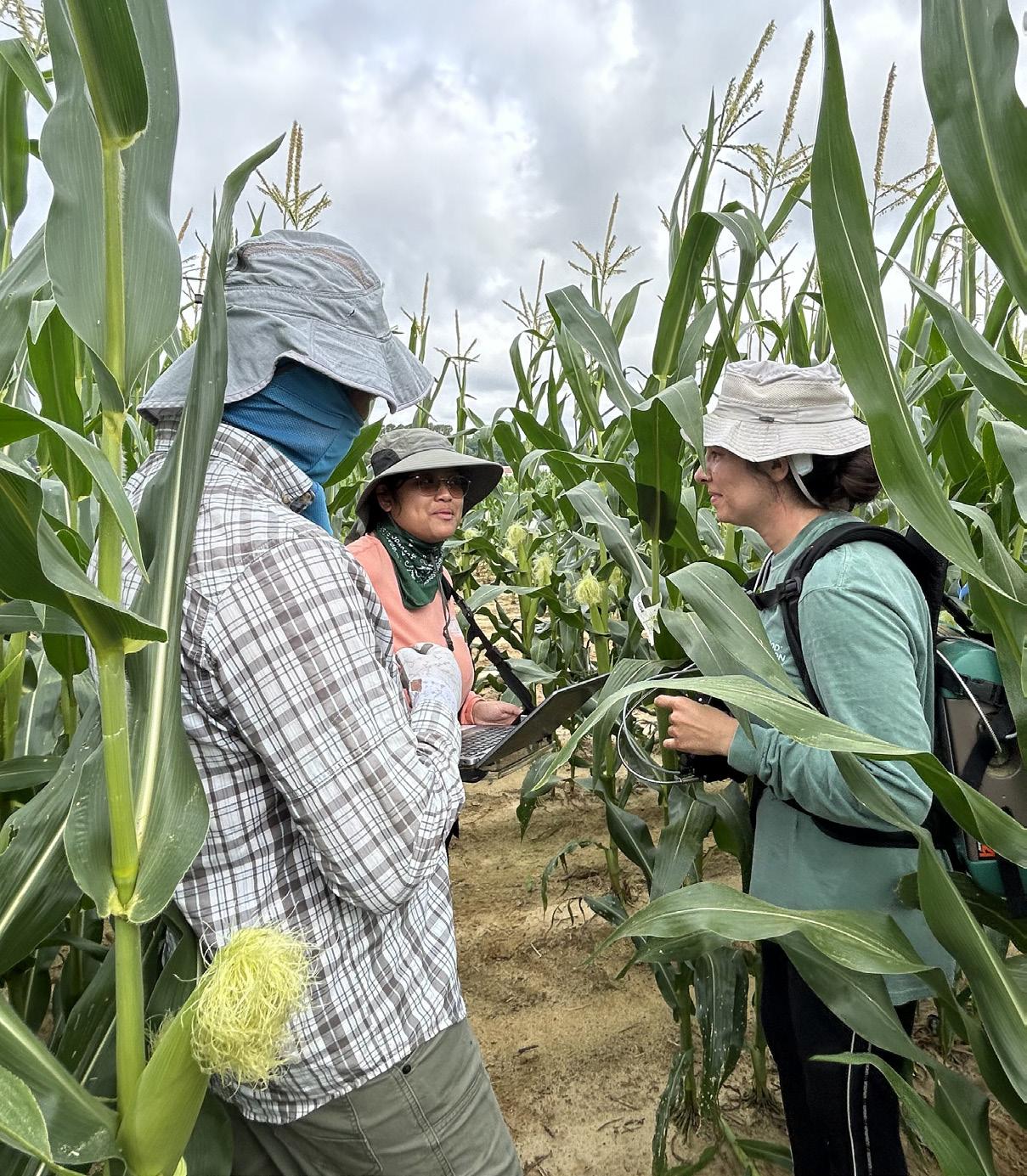
By Dee Shore
That’s how Garner High School senior Dennisha Smith-Davis describes her experience in the 2025 North Carolina Youth Institute.
She was nervous when she signed up for the two-day event at NC State University’s Plant Sciences Building this spring. The gathering, one of 35 World Food Prize Foundationaffiliated institutes held around the globe, challenges students to research issues related to food, agriculture and sustainability and share their ideas for solving them.
“Coming from a nonagricultural space, I didn’t feel like I had enough knowledge to be a representative of my school,” Smith-Davis recalls.
But she was more than prepared. She spent months of time on her own studying the social, political and agricultural factors surrounding high obesity rates in Nauru, the world’s tiniest island nation. She thought deeply about potential solutions. And at the institute, she shared her work through a paper, a poster and a roundtable discussion.
In return for that hard work, Smith-Davis gained confidence, built connections with others sharing her interest in agricultural and environmental challenges, and developed research and presentation skills that have helped her in school.
The experience taught her that diligence and effort are strengths. “I realized I don’t need to feel ashamed for trying too hard,” she says.
Smith-Davis credits the institute’s co-chairs, Liz Driscoll and Sarah Dinger, as “the most uplifting, motivational people I know. They’re so positive and optimistic, and being able to bounce off their energy is really helpful.”

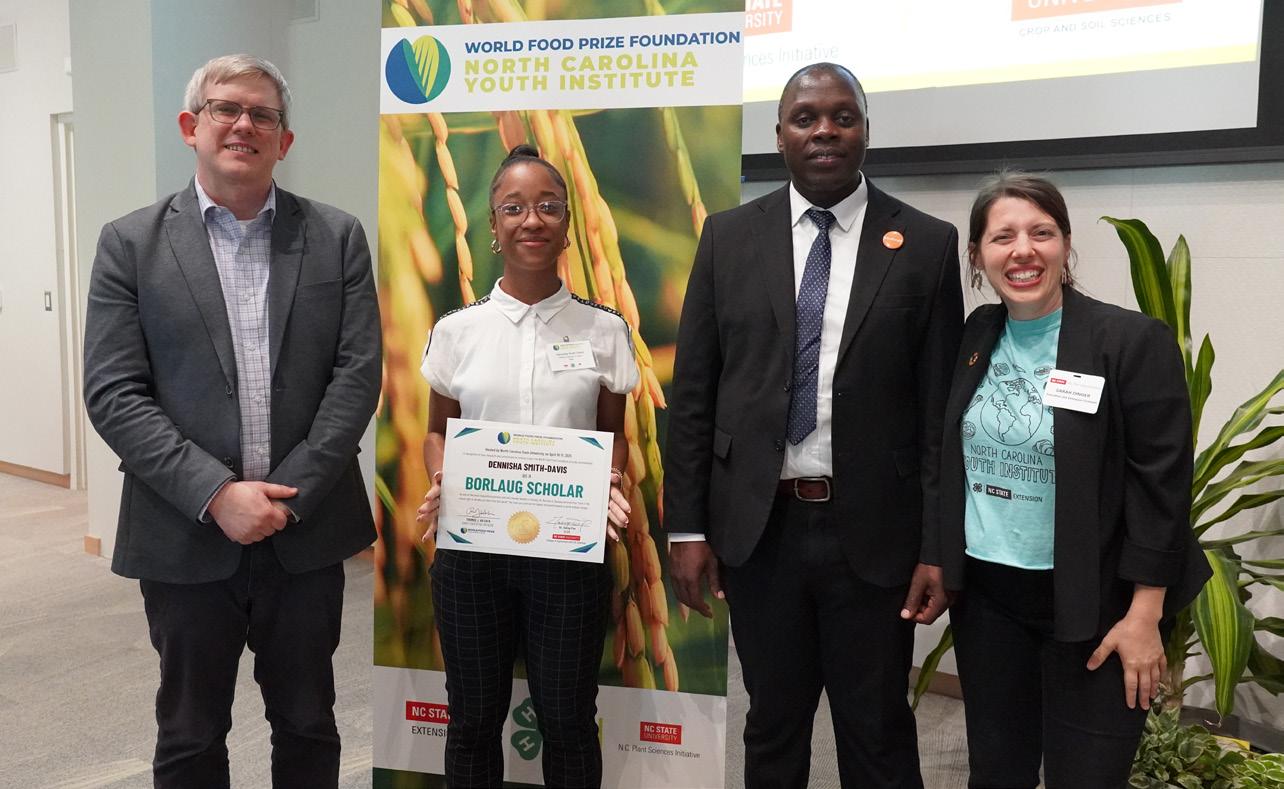
This year, Driscoll, an NC State Extension 4-H specialist, and Dinger, the N.C. Plant Sciences Initiative’s program manager for education and extension outreach, focused on expanding the institute.
Thanks to generous donations from Larry and Judy Roberts, Becky Boston and Scott Shore, and International Farming Corp., along with the involvement of FFA advisers, 4-H agents and leaders, agriculture and science teachers, and industry scientists from across the state, the institute hosted 70 secondary school students. It was the largest group in the institute’s 11-year history.
That record-breaking attendance allows North Carolina to send additional delegates — Smith-Davis and four others — to the all-expenses-paid weeklong Global Youth Institute in Des Moines, Iowa, in October.

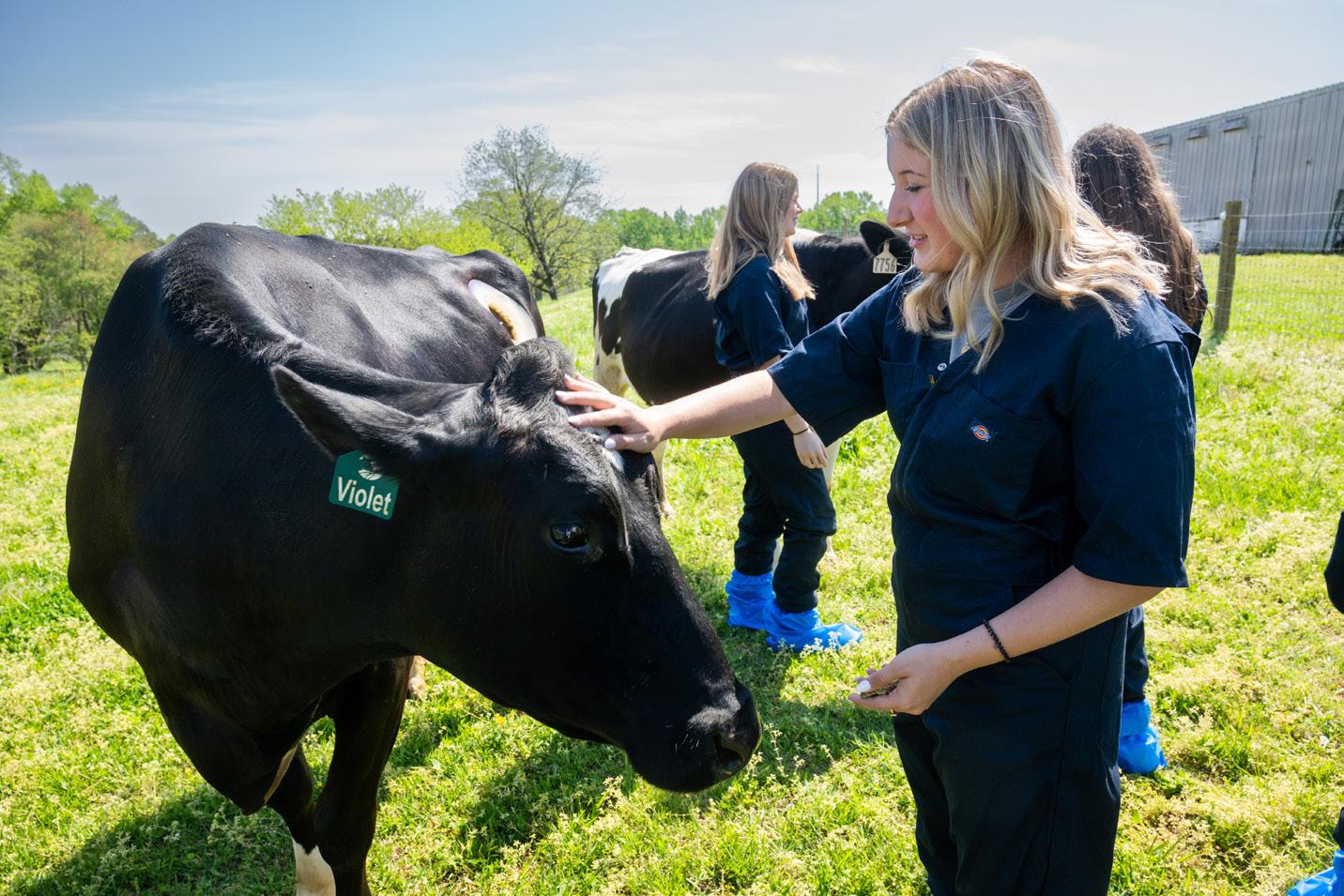
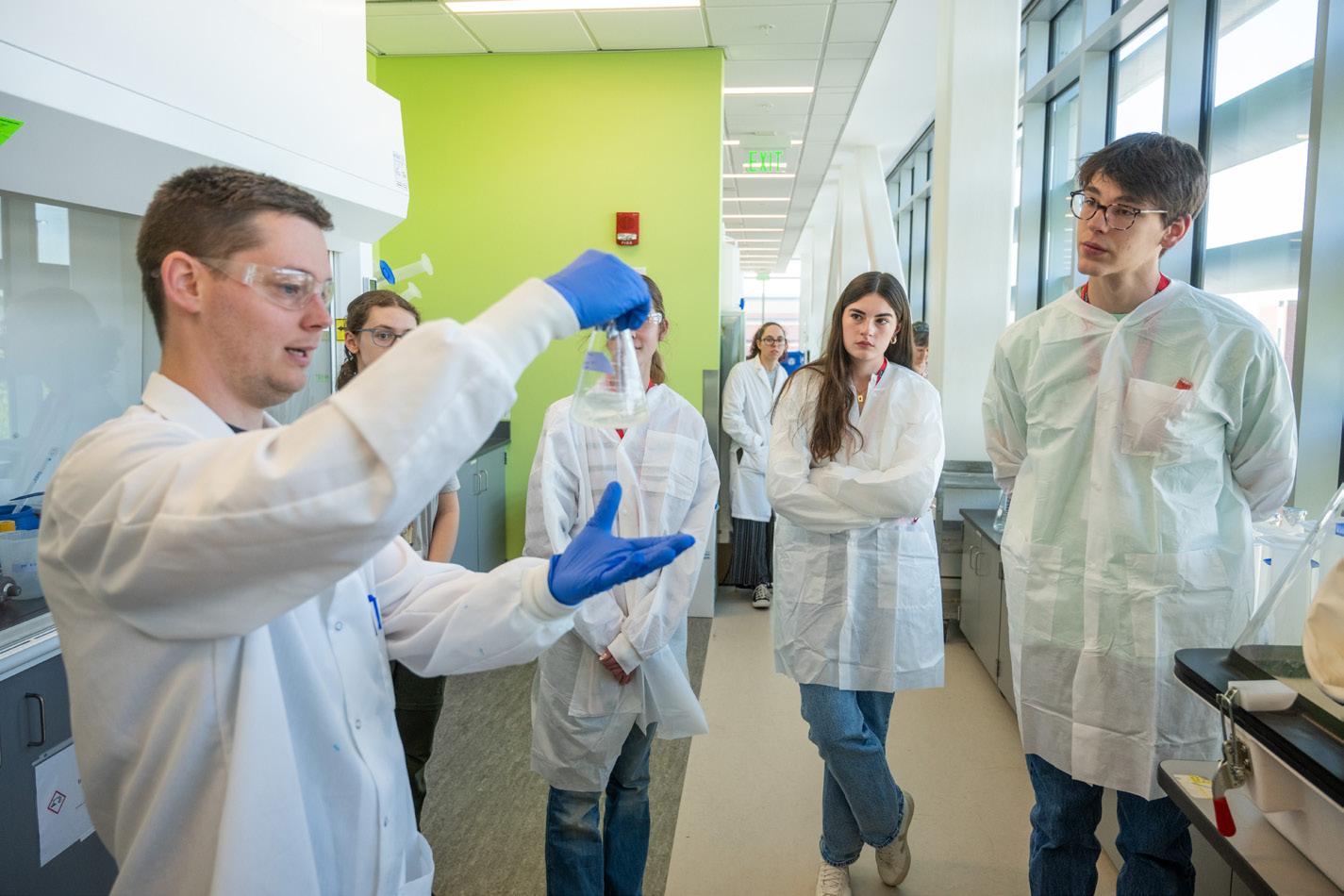
In another first for the North Carolina institute, the co-chairs invited students from Apex Middle School to attend as an initial step toward finding the best ways to involve younger students in the future.
Other offerings for 2025 included a workshop for teachers funded by a National Science Foundation grant and a new research externship program for high school students.
Through the externship program, selected students were paired with mentors, including Extension educators, an industry scientist and graduate students from the colleges of Agriculture and Life Sciences, Design, and Engineering.
In the months leading up to the institute, regularly scheduled online meetings allowed mentees to discuss their projects with their mentors and get advice on planning, carrying out and writing up the results of their research.
Then students shadowed their mentors on the first day of the institute and participated in a range of handson science activities, from flying drones to identifying plants to exploring bovine anatomy. St. Mary’s High School junior Claire Eveson was among those who participated in this year’s expanded offerings and landed a slot as an North Carolina delegate to the Global Youth Institute.
Eveson, who studied a fungal pathogen responsible for major crop losses in India, calls her youth institute experiences “life-changing.”
“It’s shown me what it’s like to work at NC State or go to NC State, what it’s like to work in a lab with other people and what it’s like to collaborate,” she says. “It’s been inspirational to see how much people here love what they’re doing and how they can make an impact, not only in North Carolina, but around the world.”
By D’Lyn Ford
“We have to value our Extension program, our research program, our teaching program, because animal science isn’t animal science without all of it.”

NC State Department Head Todd See’s future in animal science started with pigs — two bred sows that he purchased as an 8-year-old 4-H member. His family had a small farm in southeastern Michigan, where his dad worked as an engineer for Ford.
By the time See was in high school, he had 60 pigs. “It became a whole family project,” he says. By that point, his mom had started a career as a 4-H agent. Through his parents’ involvement with industry groups, See knew extension swine specialists in three states.
He chose Michigan State for college, planning to return home to farm. But given the farm’s modest size and increasing urban pressure, he opted for graduate school at the University of Georgia, where he earned master’s and doctoral degrees in swine genetics, graduating in 1992.
“At that time, North Carolina was exploding in the swine industry,” See says. “Smithfield had just opened the world’s largest pork processing plant in Tar Heel, and Murphy
Farms, Prestage, Carroll’s Foods and others were growing fast. It was the exciting place to be.”
As an Extension swine specialist based at the Vernon G. James Research and Extension Center in Plymouth, See started work at a crossroads for the pork industry.
“All the rules and regulations that dictate hog farming today were coming into place,” he says. “I always tell people that Jack Parker, the swine specialist in the northeast before me, spent his whole career helping these independent producers get into business. And I spent three years helping them get out. … We went to more of the integrated industry that exists today at that point, which was a major shift.”
See logged 60,000 miles for work in his third year before moving to campus, a centralized location that allowed him to spend more time with his two young children. He continued Extension work in breeding, genetics and production management, focusing on reducing feed costs and improving bacon quality. He served as department liaison with commodity groups, becoming a full professor in 2004.
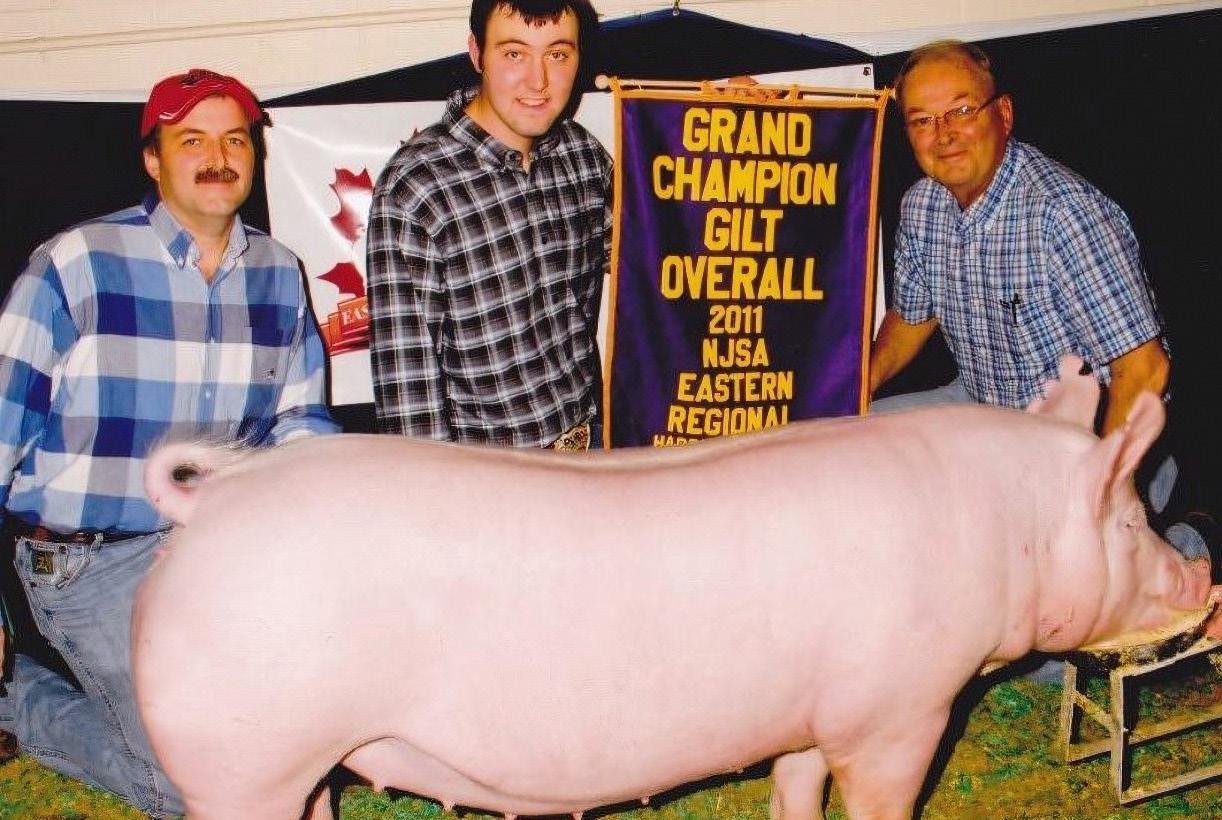

In 2008, during downsizing amid the recession, he stepped into the interim department head position.
“I saw it as an opportunity to try to help, to ensure that we had strong programs that keep a balance of research, teaching and Extension to fulfill our land-grant mission,” says See, whose appointment was made permanent in 2010. “We have to value our Extension program, our research program, our teaching program, because animal science isn’t animal science without all of it.”
Like See, many students in the department had an early love of animals. That’s why he makes time to visit with youngsters at Farm Animal Days and take prospective students and their families on a tour of Lake Wheeler Road Field Lab.
Enrollment in animal science has nearly doubled during See’s leadership, reaching 1,000 undergraduate and graduate students, many with a suburban or urban background and an interest in veterinary medicine.
He’s known for teaching a graduate course on science and communication, problem-solving with faculty and staff, and maintaining strong partnerships with industry leaders.
“He’s one of the few people I know who can go right from a corporate meeting in a coat and tie to a 4-H livestock judging contest in blue jeans and be genuine and comfortable in both,” says Brent Jennings, Extension associate for 4-H livestock.
See received the 2025 Distinguished Service Award from the National Pork Board, which cited his vision and leadership. As the longest-serving department head among his current CALS peers, he follows values he learned from his family and 4-H: helping others and making a contribution.
“It probably informs everything I do, which is why I think I’ve stuck at the department head job so long,” he says. “How can I help people be better versions of themselves?”
Photos L-R: Todd See with a steer in 1983; Todd See celebrates a grand champion win for his son, Garrett, and with his father, Larry, in 2011; Talking about North Carolina’s livestock industry during a 2015 NC State football game at Carter-Finley Stadium.
By Alice Manning Touchette

There’s a buzz in the gardens at JC Raulston Arboretum (JCRA), and it’s not just the bees. JCRA will celebrate its 50th anniversary in 2026 and usher in the golden age for this beloved teaching garden and leader in horticultural preservation and conservation.
Home to one of the most diverse plant collections in the Southeast, JCRA is open to the public year-round. Today’s thriving garden was the vision of founder J.C. Raulston, who started the garden in 1976 to create a living laboratory for NC State horticultural science students and faculty and grow the North Carolina nursery industry through plant trials and distribution.
“As a young student, I had no idea that my great teacher was a world-recognized authority in horticulture,” says alumnus Richard Olsen, a former JCRA intern who now serves as the director of the U.S. National Arboretum in Washington, D.C.
Raulston started the student intern program — which continues to this day — leaving students with long to-do lists that ran from propagation to transplanting to preparing plants for trade shows, all while mapping the sprawling inventory. Beyond developing their skills for industry and research careers, students were connected to a worldwide network of experts in horticulture research.
“The number of doors that opened for me because of NC State and Dr. J.C. Raulston have been unbelievable,” Olsen says. “That was his magic: J.C. was always providing students with opportunities to connect with horticulture and nursery professionals from around the world. It made us all see that we could build networks and have careers.”
Today, JCRA is led by director Mark Weathington, and its legacy is well-tended. Through 342 public education programs each year and extensive plant trials, JCRA has evaluated nearly 40,000 plants from 17,000 taxa over the past five decades.
“It’s all about preservation,” Weathington says. “There are plants and trees that would disappear without the cultivation and breeding work done at the gardens and through NC State.”
Its value goes beyond preservation, Olsen says: “Arboreta like JCRA collect and conserve plant genetic resources. They don’t just diversify our landscapes; they provide the genetic resources that may solve agricultural problems in the future.”
JCRA also provides green space for the community, a crucial element of well-being. And it’s not just beautiful — it’s good for you. Research from the Journal of Global Health shows that 92% of people see improvements in health outcomes when they engage with natural outdoor environments.
“Plants can make your life better,” says David Hoffman, chief executive officer of Hoffman Nursery and former JCRA intern who majored in horticultural science at NC State. “The JCRA is a place that brings people together, and they get to explore every part of the 10.5 acres.”






< Learn more about the





When alumnus Tony Avent gifted Juniper Level Botanic Gardens (JLBG) to NC State’s JCRA, he did so with the urgency of knowing his nearly 40 years of work in plant conservation needed to continue without him.
“The only way to study plants is to grow them, communicate with other experts and share ideas about how to help them thrive,” Avent says.
His gift inspired NC State to establish an endowment with an ambitious $20 million goal. Once fully funded, the endowment will generate operational funds to maintain the 28-acre research garden and its massive plant data collection. The sister teaching gardens will host a combined breeding collection that includes over 29,000 taxa of herbaceous and woody plants — tripling NC State’s current collection.
“The endowment will allow us to shepherd this vast genetic collection and fulfill our mission of educating students, professionals and the public. It’s an extraordinary resource for advancing botanic research and serving the greater community.”
Mark Weathington Director, JCRA
the annual Moonlight in
horticulturalists venture on collecting trips to more than 55 countries, including this trip to the Mexican mountains with J.C. Raulston in 1992. 8. Wolfgang, NC State’s youngest corpse flower, or titan arum, bloomed for the first time at JCRA in 2023. 9. Xeric Garden
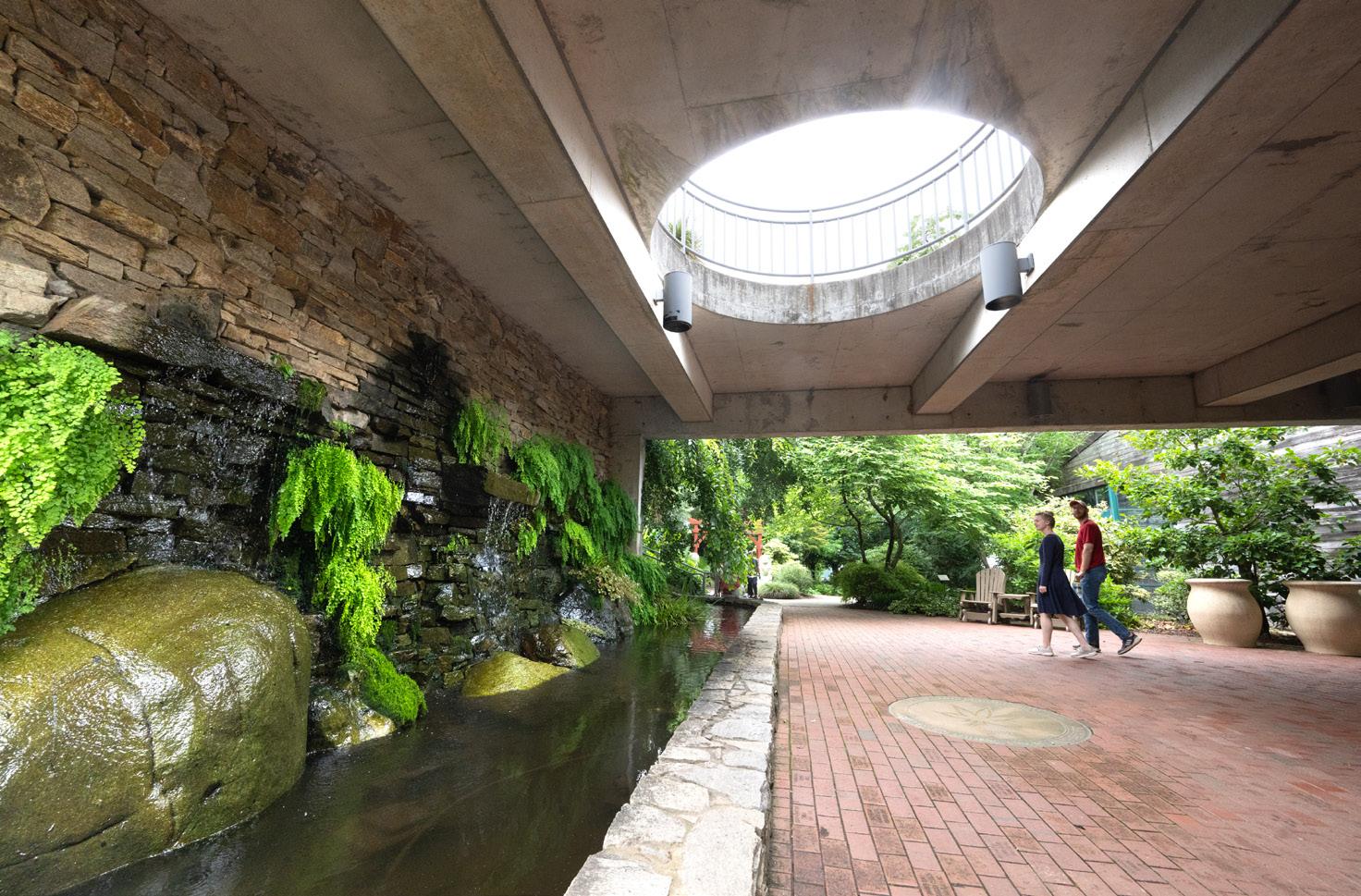
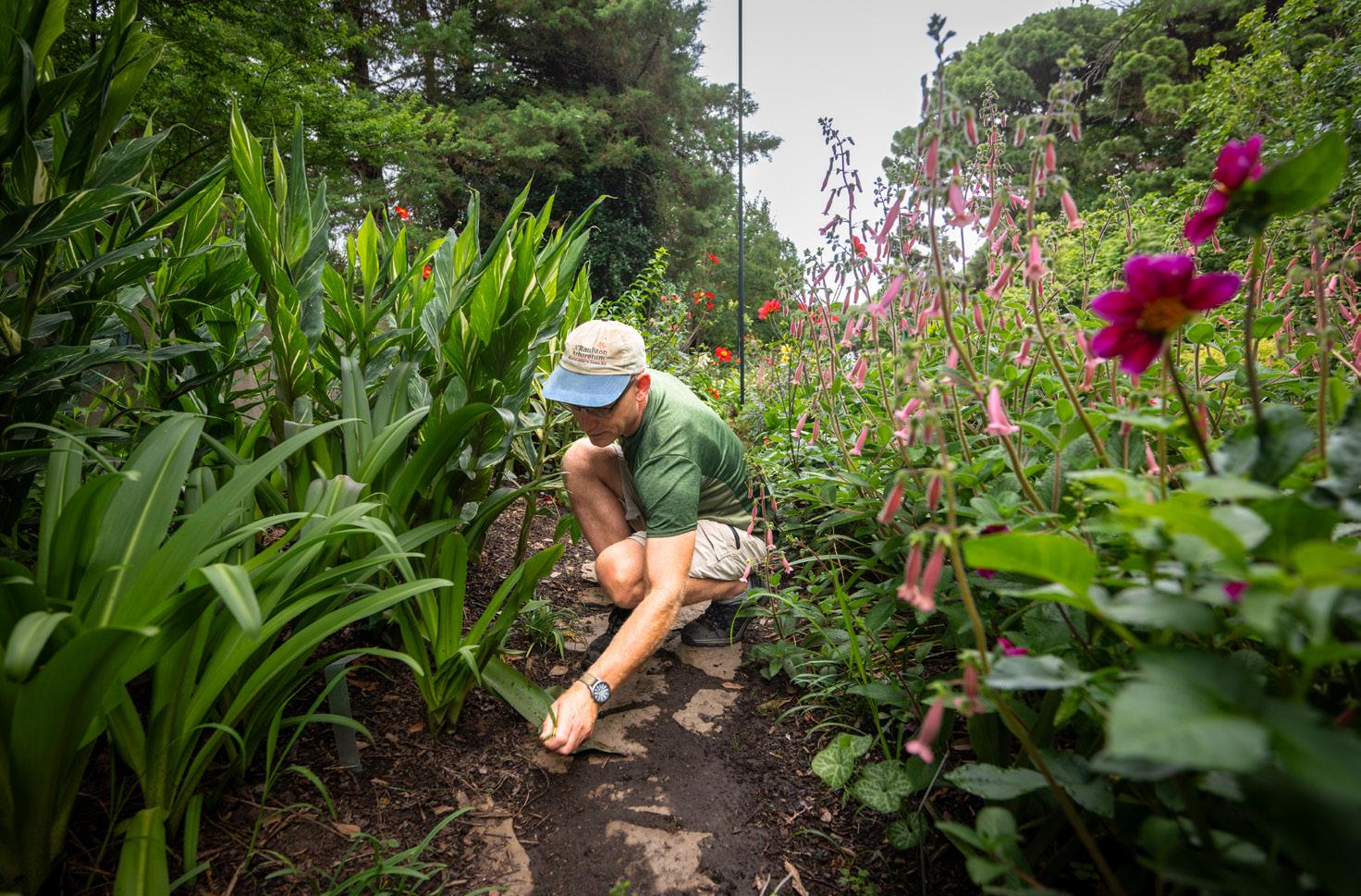
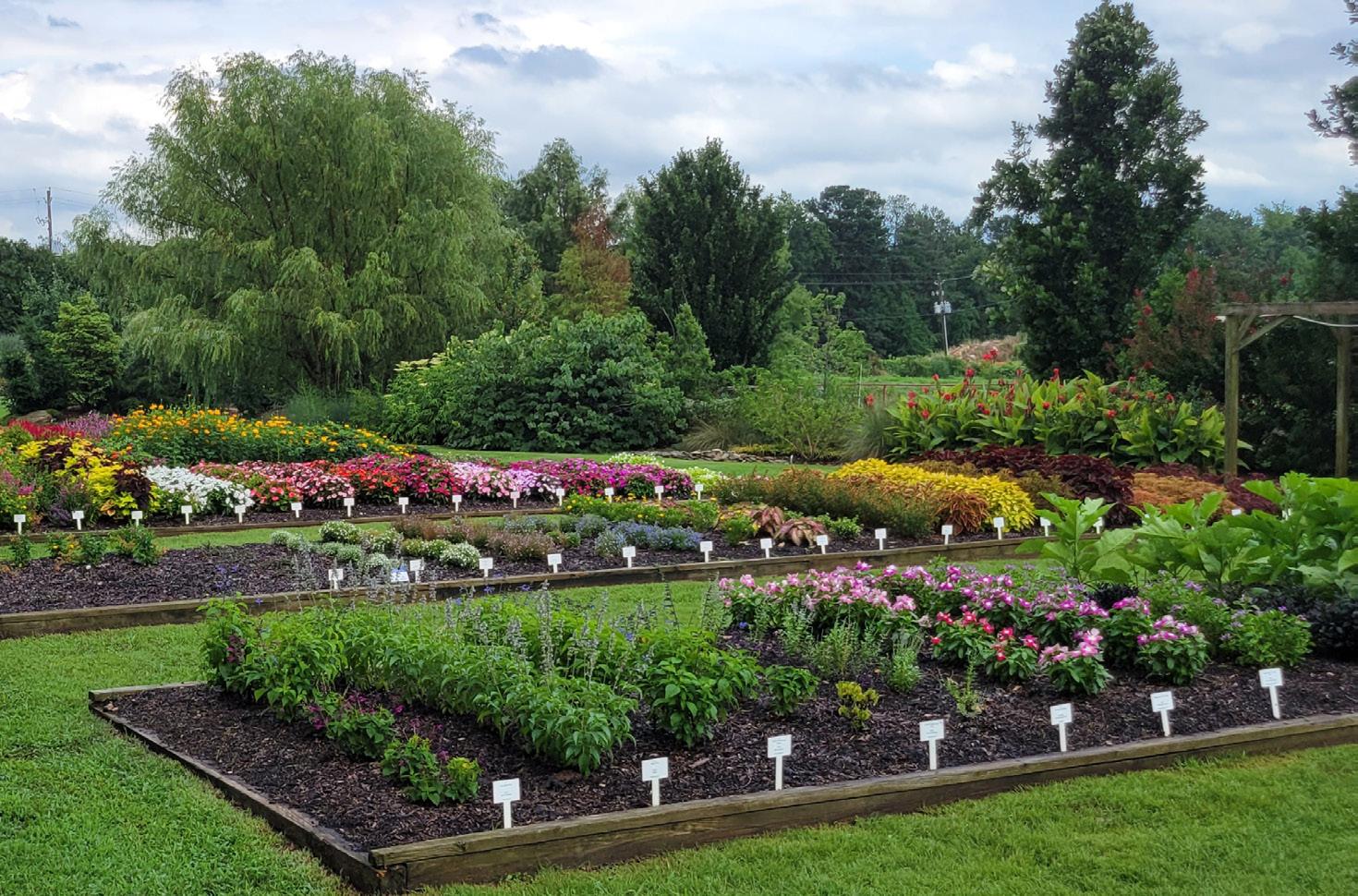
10.5 total acres
300 active volunteers
342 public education programs
10,000 unique taxa in the living collection
16,000+ plants and seeds distributed to the public annually
40,000 plants of 17,000 taxa trialed in the gardens

Top: Ruby C. McSwain Education Center, Middle: Tim Alderton works on a border of geophytes, plants that contain an underground storage organ to help survive adverse weather conditions like cold or drought. Bottom: The annual Color Trials feature 700 new varieties of bedding plants. This area is one of the 21 official All-America Selections (AAS) testing sites.

A new fall tradition from NC State CALS Nov. 8, 2025
Rooted in the spirit of gathering and gratitude, Wolfpack Harvest brings alumni, students, families and friends together to celebrate CALS — not just in Raleigh, but wherever the Pack calls home.
Join us Nov. 8 for family-friendly events across North Carolina and celebrate what we grow together.


Hurricane Helene forever changed the landscape of western North Carolina, but the region is rebounding with help from NC State Extension. See page 24.